Eldritch Moon Release Notes
Compiled by Eli Shiffrin and Matt Tabak, with contributions from Laurie Cheers, Carsten Haese, Zoe Stephenson, and Thijs van Ommen.
Document last modified June 24, 2016.
DOC Download Links:
English | 中国话,汉语;中文 | 中國話,漢語;中文 | Français | Deutsch
Italiano | 日本語 | 한글 | Português | русский язык | Español
The Release Notes include information concerning the release of a new Magic: The Gathering set, as well as a collection of clarifications and rulings involving that set’s cards. It’s intended to make playing with the new cards more fun by clearing up the common misconceptions and confusion inevitably caused by new mechanics and interactions. As future sets are released, updates to the Magic rules may cause some of this information to become outdated. If you can’t find the answer you’re looking for here, please contact us at Wizards.com/CustomerService.
The “General Notes” section includes release information and explains the mechanics and concepts in the set.
The “Card-Specific Notes” section contains answers to the most important, most common, and most confusing questions players might ask about cards in the set. Items in the “Card-Specific Notes” section include full card text for your reference. Not all cards in the set are listed.
GENERAL NOTES
Release Information
The Eldritch Moon set contains 205 cards (74 common, 70 uncommon, 47 rare, and 14 mythic rare).
Prerelease events: July 16–17, 2016
Launch Weekend: July 22–24, 2016
Game Day: August 13–14, 2016
The Eldritch Moon set becomes legal for sanctioned Constructed play on its official release date: Friday, July 22, 2016. At that time, the following card sets will be permitted in the Standard format: Dragons of Tarkir, Magic Origins, Battle for Zendikar, Oath of the Gatewatch, Shadows over Innistrad, and Eldritch Moon.
Go to Magic.Wizards.com/Rules for a complete list of formats and permitted card sets.
Go to Wizards.com/Locator to find an event or store near you.
New Mechanic: Meld Cards
Emrakul’s presence on Innistrad corrupts its denizens, twisting Humans, Werewolves, and Vampires alike into monstrous versions of themselves. For some, this influence has not merely warped them; it has melded them with other beings—or even with objects around them—to form terrifying testaments to Emrakul’s power.
The two cards in the meld pair below are Bruna, the Fading Light and Gisela, the Broken Blade. These cards behave like normal Magic cards most of the time. But if you own and control both halves of this meld pair on the battlefield, they’ll combine into an oversized Eldrazi card: Brisela, Voice of Nightmares. The top half of Brisela is printed on the back of Gisela’s card, and the bottom half of Brisela is printed on the back of Bruna’s card.
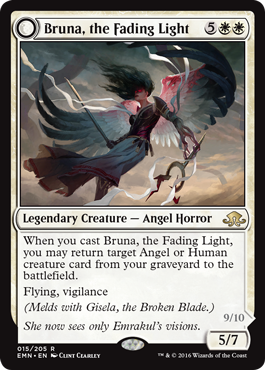
Bruna, the Fading Light
5WW
Legendary Creature — Angel Horror
5/7
Flying, vigilance
When you cast Bruna, the Fading Light, you may return target Angel or Human creature card from your graveyard to the battlefield.
(Melds with Gisela, the Broken Blade.)
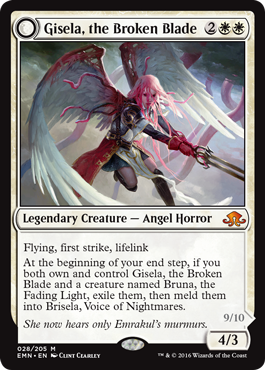
Gisela, the Broken Blade
2WW
Legendary Creature — Angel Horror
4/3
Flying, first strike, lifelink
At the beginning of your end step, if you both own and control Gisela, the Broken Blade and a creature named Bruna, the Fading Light, exile them, then meld them into Brisela, Voice of [autocard]Nightmares[/autocard].
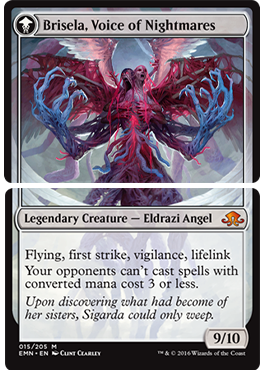
Brisela, Voice of [autocard]Nightmares[/autocard]
*colorless*
Legendary Creature — Eldrazi Angel
9/10
Flying, first strike, vigilance, lifelink
Your opponents can’t cast spells with converted mana cost 3 or less.
- When Bruna, the Fading Light and Gisela, the Broken Blade are melded, the result is a single creature—Brisela, Voice of [autocard]Nightmares[/autocard]—that’s represented by two cards. If Brisela dies, both cards are put into your graveyard. As Brisela leaves the battlefield, both of those cards are turned face up again. If the cards are put on the top or bottom of your library, you choose their relative order.
- Although meld cards look similar to double-faced cards, they are not considered to be double-faced cards. They don’t transform—instead, their back faces combine in pairs to form a single oversized card face.
- One card in each pair of meld cards has an ability that instructs you to exile the two cards and meld them. If you control more than one object with one of those names, you select one object with that name to exile.
- When two cards are exiled and melded, they each leave the battlefield, then return together as one new untapped object with no relation to either of the objects that left the battlefield. Counters, Auras, Equipment, and other effects that affected those two cards don’t affect the melded permanent.
- Only two cards belonging to the same meld pair can be melded. Tokens, cards that aren’t meld cards, or meld cards that don’t form a meld pair can’t be melded. If an effect instructs a player to meld cards that can’t be melded, those cards remain in exile.
- While a meld card is anywhere other than the battlefield, or is on the battlefield with its front face up, it has only the characteristics of its front face.
- While a melded permanent is on the battlefield, it has only the characteristics of its combined back face. Any effects that modify how the new object enters the battlefield will consider only the combined back face.
- Note that the combined back faces are colorless.
- The converted mana cost of a melded permanent is the sum of the converted mana costs of its front faces. A creature that becomes a copy of a melded permanent has only the characteristics of that combined back face, and its converted mana cost is 0.
- A player prompted to name a card may name the combined back face, and each player has the right to know that combined back face’s characteristics at all times.
- If an effect moves a melded permanent to a new zone and then affects “that card," it affects both cards.
The official rules for meld cards are as follows:
701.34. Meld
701.34a Meld is a keyword action that appears in an ability on one card in a meld pair. (See rule 712, “Meld Cards.") To meld the two cards in a meld pair, put them onto the battlefield with their back faces up and combined. The resulting permanent is a single object represented by two cards.
701.34b Only two cards belonging to the same meld pair can be melded. Tokens, cards that aren’t meld cards, or meld cards that don’t form a meld pair can’t be melded.
701.34c If an effect instructs a player to meld cards that can’t be melded, they stay in their current zone.
Example: A player owns and controls Midnight Scavengers and a token that’s a copy of Graf Rats. At the beginning of combat, both are exiled but can’t be melded. Midnight Scavengers remains exiled.
712. Meld Cards
712.1. A meld card has a Magic card face on one side and half of an oversized Magic card face on the other. It doesn’t have a Magic card back.
712.1a There are three specific meld pairs. Each meld pair consists of two specific cards whose back faces combine to form one oversized Magic card face: Midnight Scavengers and Graf Rats meld to form Chittering Host; Hanweir Garrison and Hanweir Battlements meld to form Hanweir, the Writhing Township; and Bruna, the Fading Light and Gisela, the Broken Blade meld to form Brisela, Voice of [autocard]Nightmares[/autocard].
712.1b A meld card isn’t a double-faced card. It can’t transform or enter the battlefield transformed. (See rule 711, “Double-Faced Cards.")
712.2. One card in each meld pair has an ability that exiles both that object and its counterpart and melds them. To meld the two cards in a meld pair, put them onto the battlefield with their back faces up and combined (see rule 701.34, “Meld”). The resulting permanent is a single object represented by two cards.
712.3. The front face of each meld card and the combined face formed by a meld pair each has its own set of characteristics.
712.3a While a meld card is outside the game, in a zone other than the battlefield, or on the battlefield with its front face up, it has only the characteristics of its front face.
712.3b While the two cards of a meld pair are on the battlefield as a melded permanent, the object represented by those cards has only the characteristics of the combined back face, except that its converted mana cost is the sum of the converted mana costs of its front faces. If a permanent is copying a melded permanent, the converted mana cost of the copy is 0. See rule 202.3c.
712.3c Anything that needs information about a meld card sees only the information given by the face that is currently up.
Example: A Clone enters the battlefield as a copy of Chittering Host (the combined back face of a meld pair). It will have the characteristics of Chittering Host, even though the object it becomes is represented by only a single card.
712.4. If a melded permanent leaves the battlefield, one permanent leaves the battlefield and two cards are put into the appropriate zone.
Example: Chittering Host, a melded permanent, dies. An ability that triggers “whenever a creature dies” triggers once. An ability that triggers “whenever a card is put into a graveyard from anywhere” triggers twice.
712.4a If a melded permanent is put into its owner’s graveyard or library, that player may arrange the two cards that represented it in any order. If it’s put into its owner’s library, that player doesn’t reveal the order.
712.4b If a player exiles a melded permanent, that player determines the relative timestamp order of the two cards at that time. This is an exception to the procedure described in rule 613.6j.
Example: Duplicant is a card with the abilities “When Duplicant enters the battlefield, you may exile target nontoken creature” and “As long as a card exiled with Duplicant is a creature card, Duplicant has the power, toughness, and creature types of the last creature card exiled with Duplicant. It’s still a Shapeshifter." As Duplicant’s first ability exiles Chittering Host, a melded permanent, Duplicant’s controller chooses whether the last creature card exiled is Midnight Scavengers or Graf Rats.
712.4c If an effect can find the new object that a melded permanent becomes as it leaves the battlefield, it finds both cards. (See rule 400.7.) If that effect causes actions to be taken upon those cards, those actions are taken upon each of them.
Example: False Demise is an Aura with the ability “When enchanted creature dies, return that card to the battlefield under your control." A Chittering Host enchanted by False Demise dies. The triggered ability returns both Midnight Scavengers and Graf Rats to the battlefield.
Example: Otherworldly Journey is an instant that reads “Exile target creature. At the beginning of the next end step, return that card to the battlefield under its owner’s control with a +1/+1 counter on it." A player casts Otherworldly Journey targeting Chittering Host, a melded permanent. Chittering Host is exiled. At the beginning of the next end step, Midnight Scavengers and Graf Rats are both returned to the battlefield, each with a +1/+1 counter on it.
712.4d If a melded permanent moves to another zone, both cards move to that zone. If multiple replacement effects could be applied to the zone change, applying one to one of the two cards affects both cards. If the melded permanent is a commander, it may be exempt from this rule; see rule 903.9a.
Example: Leyline of the Void is an enchantment that reads, in part, “If a card would be put into an opponent’s graveyard from anywhere, exile it instead." Wheel of Sun and Moon is an Aura with enchant player and the ability “If a card would be put into enchanted player’s graveyard from anywhere, instead that card is revealed and put on the bottom of its owner’s library." If the controller of Chittering Host is affected by both cards’ effects, that player chooses one effect to apply to the event and Midnight Scavengers and Graf Rats are both moved to the appropriate zone.
712.5. Players who are allowed to look at a meld card may look at its half of the combined back face. Players may access Oracle text for the other member of the meld pair and the combined face at any time (see rule 108.1).
712.6. Meld cards in a player’s deck may be represented by checklist cards. See rule 713, “Checklist Cards."
712.8. If a meld card is cast as a spell, it’s put on the stack with its front face up. See rule 601, “Casting Spells."
712.9. A meld card enters the battlefield with its front face up unless it’s being melded with its counterpart.
712.10. If an effect allows a player to cast a meld card as a face-down spell, or if a meld card enters the battlefield face down, it will have the characteristics given to it by the rule or effect that caused it to be face down. That card remains hidden, using either a face-down checklist card or opaque sleeves. See rule 707, “Face-Down Spells and Permanents."
712.11. Meld cards on the battlefield and melded permanents can’t be turned face down. If a spell or ability tries to turn such a permanent face down, nothing happens.
712.12. If an effect instructs a player to name a card, the player may name the front face of a meld card or the combined back face of a meld pair.
New Mechanic: Emerge
The emerge mechanic lets you summon your Eldrazi abominations at a discount by letting them burst forth from your lesser creatures.
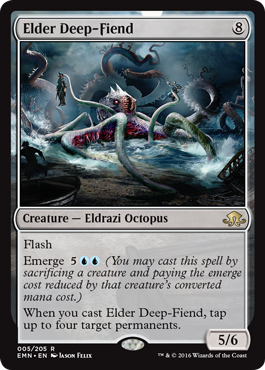
Elder Deep-Fiend
8
Creature — Eldrazi Octopus
5/6
Flash
Emerge 5UU (You may cast this spell by sacrificing a creature and paying the emerge cost reduced by that creature’s converted mana cost.)
When you cast Elder Deep-Fiend, tap up to four target permanents.
The official rules for emerge are as follows:
702.118. Emerge
702.118a Emerge represents two static abilities that function while the spell with emerge is on the stack. “Emerge [cost]” means “You may cast this spell by paying [cost] and sacrificing a creature rather than paying its mana cost” and “If you chose to pay this spell’s emerge cost, its total cost is reduced by an amount of generic mana equal to the sacrificed creature’s converted mana cost." Paying a card’s emerge cost follows the rules for paying alternative costs in rules 601.2b and 601.2f–h.
702.118b You choose which creature to sacrifice as you choose to pay a spell’s emerge cost (see rule 601.2b), and you sacrifice that creature as you pay the total cost (see rule 601.2h).
- Each card with emerge is colorless and has an emerge cost that includes one or more colors of mana. These cards are still colorless if you pay the emerge cost.
- A creature’s converted mana cost is determined solely by the mana symbols printed in its upper right corner (unless that creature is the back face of a double-faced card, is a melded permanent, or is copying something else; see below). If the mana cost includes X, X is considered to be 0. If it’s a single-faced card with no mana symbols in its upper right corner (because it’s an animated land, for example), its converted mana cost is 0. Ignore any alternative costs or additional costs (such as kicker) that were paid as the creature was cast.
- Colored mana components of emerge costs can’t be reduced this way.
- You may sacrifice a creature with a converted mana cost of 0, such as a token creature that’s not a copy of another permanent, to cast a spell for its emerge cost. You’ll just pay the full emerge cost with no reduction.
- You may sacrifice a creature with converted mana cost greater than or equal to the emerge cost. If you do, you’ll pay only the colored mana component of the emerge cost.
- If you sacrifice a creature with X in its mana cost, that X is considered to be 0.
- The converted mana cost of the back face of a double-faced card is the converted mana cost of its front face. The converted mana cost of a melded permanent is the sum of the converted mana costs of its front faces. A creature that’s a copy of either has a converted mana cost of 0.
- The converted mana cost of a creature spell with emerge isn’t affected by whether its emerge cost is paid. For example, if you cast Elder Deep-Fiend for its emerge cost and sacrifice a creature whose converted mana cost is 3, Elder Deep-Fiend’s converted mana cost remains 8.
- The creature chosen to be sacrificed is still on the battlefield up through the time that you activate mana abilities. Its abilities may affect the spell’s cost, be activated to generate mana, and so on. However, if it has an ability that triggers when a spell is cast, it will have been sacrificed before that ability can trigger.
- Once you begin to cast a spell with emerge, no player may take actions until you’re done. Notably, opponents can’t try to remove the creature you wish to sacrifice.
New Mechanic: Escalate
Modal spells with the escalate ability give you even more options to help defend Innistrad against unnatural horrors.
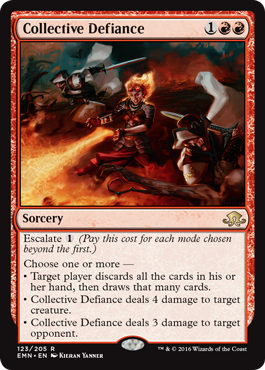
Collective Defiance
1RR
Sorcery
Escalate 1 (Pay this cost for each mode chosen beyond the first.)
Choose one or more —
- Target player discards all the cards in his or her hand, then draws that many cards.
- Collective Defiance deals 4 damage to target creature.
- Collective Defiance deals 3 damage to target opponent.
The official rules for escalate are as follows:
702.119. Escalate
702.119a Escalate is a static ability of modal spells (see rule 700.2) that functions while the spell with escalate is on the stack. “Escalate [cost]” means “For each mode you choose for this spell beyond the first, you pay an additional [cost]." Using the escalate ability follows the rules for choosing modes and paying additional costs in rules 601.2b and 601.2f–h.
702.119b If more than one mode is chosen, follow the text of each of the chosen modes in the order written on the card as the spell resolves.
- You choose all of your modes at once. You can’t wait to perform one mode’s actions and then decide to choose more modes.
- You can’t choose any one mode multiple times.
- If two of the chosen modes target a creature, you may choose the same creature for each mode’s target, or choose different creatures. The same is true if the chosen modes target a player (or opponent).
- If one target of an escalate spell becomes illegal, the other targets will still be affected. If all of the targets become illegal, the spell will be countered.
- Effects that reduce the cost of spells reduce the total cost, including any escalate costs added.
- If an effect allows you to cast a spell that has escalate without paying its mana cost, you can pay escalate costs for that spell.
- Additional costs don’t affect a spell’s converted mana cost. For example, Collective Defiance’s converted mana cost is 3, no matter how many modes were chosen.
Returning Eldrazi Theme: “When you cast” triggered abilities
As in previous sets, many Eldrazi cards in the Eldritch Moon set have abilities that trigger when they’re cast.
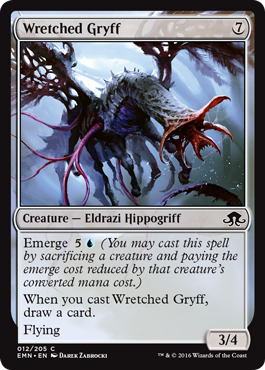
Wretched Gryff
7
Creature — Eldrazi Hippogriff
3/4
Emerge 5U (You may cast this spell by sacrificing a creature and paying the emerge cost reduced by that creature’s converted mana cost.)
Flying
When you cast Wretched Gryff, draw a card.
- A “when you cast” triggered ability resolves before the original spell resolves.
- A “when you cast” triggered ability resolves even if the original spell is countered, and the original spell resolves even if the triggered ability is countered.
Returning Shadows over Innistrad Themes and Mechanics
Eldritch Moon features a number of returning mechanics from the Shadows over Innistrad set. For more information on double-faced cards, checklist cards, delirium, madness, and skulk, please see the Shadows over Innistrad Release Notes.
CARD-SPECIFIC NOTES
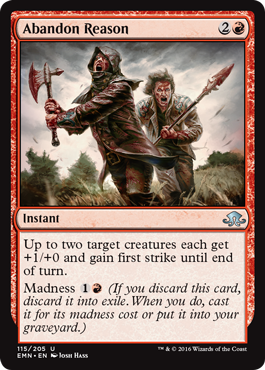
Abandon Reason
2R
Instant
Up to two target creatures each get +1/+0 and gain first strike until end of turn.
Madness 1R (If you discard this card, discard it into exile. When you do, cast it for its madness cost or put it into your graveyard.)
- You can’t target the same creature twice to have it get +2/+0.
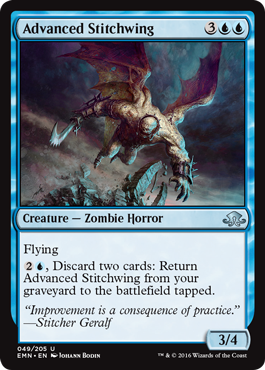
Advanced Stitchwing
3UU
Creature — Zombie Horror
3/4
Flying
2U, Discard two cards: Return Advanced Stitchwing from your graveyard to the battlefield tapped.
- Advanced Stitchwing’s last ability can only be activated while it’s in your graveyard.
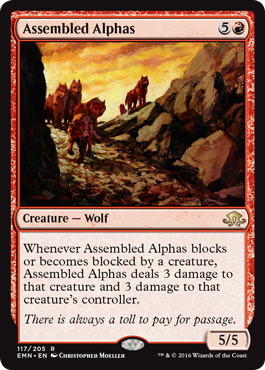
Assembled Alphas
5R
Creature — Wolf
5/5
Whenever Assembled Alphas blocks or becomes blocked by a creature, Assembled Alphas deals 3 damage to that creature and 3 damage to that creature’s controller.
- The triggered ability triggers once for each creature blocking or blocked by Assembled Alphas. The ability resolves and deals damage to that creature before combat damage is dealt. If that damage destroys all creatures blocking Assembled Alphas, Assembled Alphas doesn’t become unblocked.
- The triggered ability deals damage to the creature’s controller even if the creature isn’t dealt damage, perhaps because it has left the battlefield or because the damage was prevented.
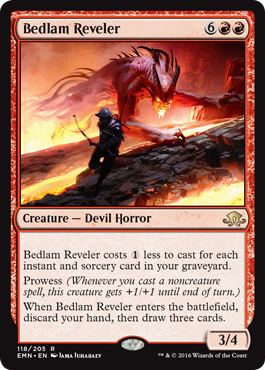
Bedlam Reveler
6RR
Creature — Devil Horror
3/4
Bedlam Reveler costs 1 less to cast for each instant and sorcery card in your graveyard.
Prowess (Whenever you cast a noncreature spell, this creature gets +1/+1 until end of turn.)
When Bedlam Reveler enters the battlefield, discard your hand, then draw three cards.
- Bedlam Reveler’s first ability can reduce only the generic mana in its cost, not the red mana.
- If you have no cards in hand as Bedlam Reveler’s last ability resolves, you’ll just draw three cards.
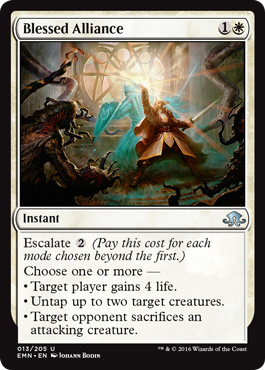
Blessed Alliance
1W
Instant
Escalate 2 (Pay this cost for each mode chosen beyond the first.)
Choose one or more —
- Target player gains 4 life.
- Untap up to two target creatures.
- Target opponent sacrifices an attacking creature.
- The targeted opponent chooses which of his or her attacking creatures to sacrifice, not you.
- Untapping an attacking creature doesn’t cause it to be removed from combat.
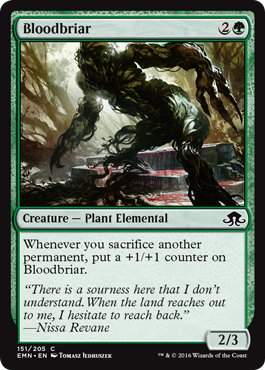
Bloodbriar
2G
Creature — Plant Elemental
2/3
Whenever you sacrifice another permanent, put a +1/+1 counter on Bloodbriar.
- Bloodbriar’s ability doesn’t give you permission to sacrifice permanents. You’ll need another effect that instructs or allows you to sacrifice them.
- If you sacrifice a permanent as part of a spell or activated ability’s cost, Bloodbriar’s ability will resolve before that spell or ability.
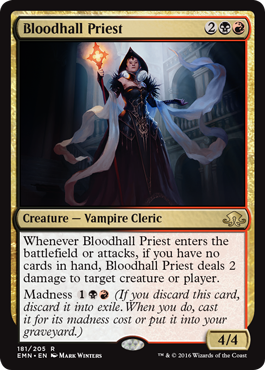
Bloodhall Priest
2BR
Creature — Vampire Cleric
4/4
Whenever Bloodhall Priest enters the battlefield or attacks, if you have no cards in hand, Bloodhall Priest deals 2 damage to target creature or player.
Madness 1BR (If you discard this card, discard it into exile. When you do, cast it for its madness cost or put it into your graveyard.)
- The triggered ability triggers both when Bloodhall Priest enters the battlefield and whenever it attacks. You don’t have to choose only one.
- If you have a card in hand at the moment the trigger condition occurs, Bloodhall Priest’s ability won’t trigger, even if you can get that card out of your hand right afterward. If you have a card in hand as the ability resolves, it has no effect. No damage will be dealt.

Bruna, the Fading Light
5WW
Legendary Creature — Angel Horror
5/7
Flying, vigilance
When you cast Bruna, the Fading Light, you may return target Angel or Human creature card from your graveyard to the battlefield.
(Melds with Gisela, the Broken Blade.)

Gisela, the Broken Blade
2WW
Legendary Creature — Angel Horror
4/3
Flying, first strike, lifelink
At the beginning of your end step, if you both own and control Gisela, the Broken Blade and a creature named Bruna, the Fading Light, exile them, then meld them into Brisela, Voice of [autocard]Nightmares[/autocard].

Brisela, Voice of [autocard]Nightmares[/autocard]
*colorless*
Legendary Creature — Eldrazi Angel
9/10
Flying, first strike, vigilance, lifelink
Your opponents can’t cast spells with converted mana cost 3 or less.
- Effects that increase or reduce the cost to cast a spell (such as those of escalate and emerge) don’t affect the spell’s converted mana cost, so they won’t change whether Brisela’s last ability restricts that spell from being cast.
- For spells with X in their mana costs, use the value chosen for X to determine if the spell’s converted mana cost is 3 or less. For example, your opponent could cast Burn from Within (a spell with mana cost XR) with X equal to 3, but not with X equal to 2.
- In a Commander game, your commander may be Bruna, the Fading Light or Gisela, the Broken Blade, and the other may be in your deck. If they meld into Brisela, Voice of [autocard]Nightmares[/autocard], Brisela will also be your commander; but if Brisela leaves the battlefield, only the card chosen as your commander at the start of the game may be put into the command zone.
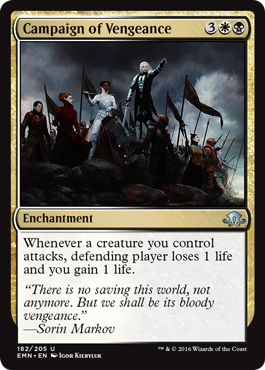
Campaign of Vengeance
3WB
Enchantment
Whenever a creature you control attacks, defending player loses 1 life and you gain 1 life.
- If a creature attacks a planeswalker, the defending player is the player who controls that planeswalker.
- In a multiplayer game, each instance of the ability affects only one defending player. For example, if you attack player A with two creatures and player B with two creatures, each of those players will lose 2 life, not 4.
- In a Two-Headed Giant game, Campaign of Vengeance’s triggered ability has one defending player of your choice lose 1 life. The team doesn’t lose 2 life.
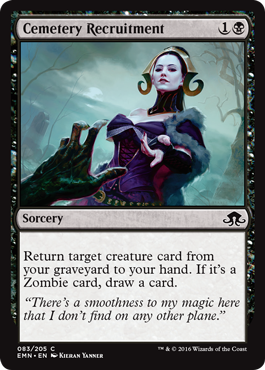
Cemetery Recruitment
1B
Sorcery
Return target creature card from your graveyard to your hand. If it’s a Zombie card, draw a card.
- If you target a Zombie card in your graveyard, drawing a card is an additional bonus. It doesn’t replace returning the Zombie card to your hand.
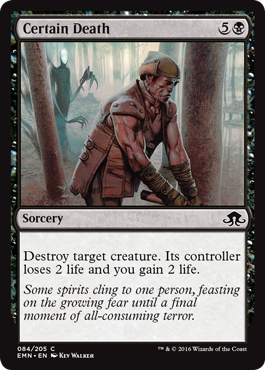
Certain Death
5B
Sorcery
Destroy target creature. Its controller loses 2 life and you gain 2 life.
- The targeted creature will have already left the battlefield before its controller loses 2 life and you gain 2 life. If it has any abilities that care about gaining or losing life, they won’t apply.
- If the creature becomes an illegal target for Certain Death, no player gains or loses life. If it’s a legal target but isn’t destroyed, most likely due to having indestructible, its controller still loses 2 life and you gain 2 life.
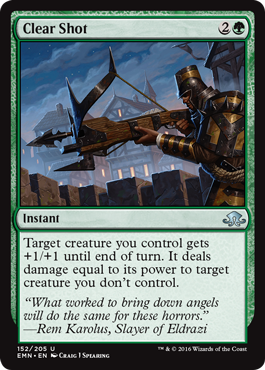
Clear Shot
2G
Instant
Target creature you control gets +1/+1 until end of turn. It deals damage equal to its power to target creature you don’t control.
- As Clear Shot tries to resolve, if either creature is an illegal target, the creature you control won’t deal damage. If the creature you control is a legal target but the other creature isn’t, your creature will still get +1/+1.
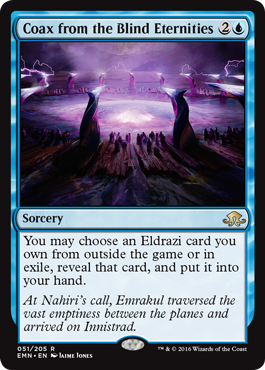
Coax from the Blind Eternities
2U
Sorcery
You may choose an Eldrazi card you own from outside the game or in exile, reveal that card, and put it into your hand.
- In a casual game, a card you choose from outside the game comes from your personal collection. In a tournament event, a card you choose from outside the game must come from your sideboard.
- A card that is exiled face down has no characteristics. You can’t choose it, even if you’re allowed to look at it.
- An Eldrazi card is one with the subtype Eldrazi. Noncreature cards with devoid from the Battle for Zendikar block are Eldrazi-themed, but they are not Eldrazi cards.
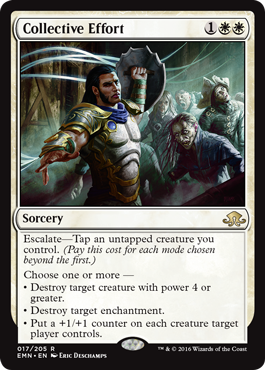
Collective Effort
1WW
Sorcery
Escalate—Tap an untapped creature you control. (Pay this cost for each mode chosen beyond the first.)
Choose one or more —
- Destroy target creature with power 4 or greater.
- Destroy target enchantment.
- Put a +1/+1 counter on each creature target player controls.
- You can tap any untapped creature you control to pay the escalate cost, including one you haven’t controlled continuously since the beginning of the turn.
- If you choose the first and third modes, and destroying the creature ends an “exile until” effect (such as that of Lunarch Inquisitors), the creature will return to the battlefield before you put +1/+1 counters on creatures. The same is true if you choose the second and third modes and destroying the enchantment ends such an effect.
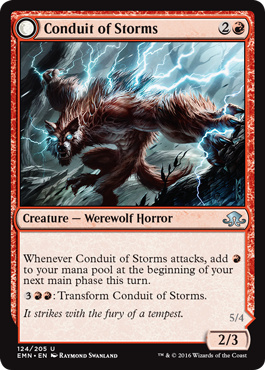
Conduit of Storms
2R
Creature — Werewolf Horror
2/3
Whenever Conduit of Storms attacks, add R to your mana pool at the beginning of your next main phase this turn.
3RR: Transform Conduit of Storms.
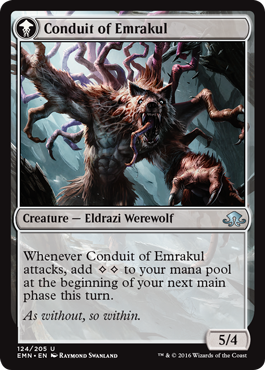
Conduit of Emrakul
Creature — Eldrazi Werewolf
5/4
Whenever Conduit of Emrakul attacks, add CC to your mana pool at the beginning of your next main phase this turn.
- You’ll add mana to your mana pool at the beginning of the next main phase whether or not Conduit of Storms or Conduit of Emrakul is still on the battlefield.
- If Conduit of Storms attacks and you transform it into Conduit of Emrakul later in combat, you’ll add R to your mana pool, not CC and not CCR.
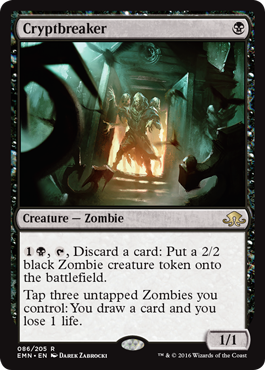
Cryptbreaker
B
Creature — Zombie
1/1
1B, T, Discard a card: Put a 2/2 black Zombie creature token onto the battlefield.
Tap three untapped Zombies you control: You draw a card and you lose 1 life.
- You can tap any three untapped Zombies you control, including ones you haven’t controlled continuously since the beginning of your most recent turn, to pay the cost of Cryptbreaker’s second activated ability. This includes Cryptbreaker itself.
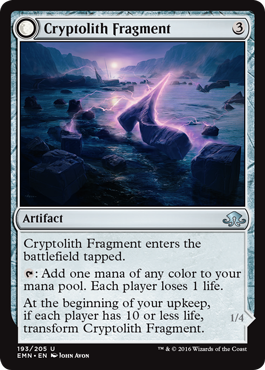
Cryptolith Fragment
3
Artifact
Cryptolith Fragment enters the battlefield tapped.
T: Add one mana of any color to your mana pool. Each player loses 1 life.
At the beginning of your upkeep, if each player has 10 or less life, transform Cryptolith Fragment.
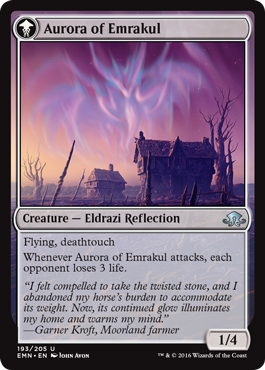
Aurora of Emrakul
Creature — Eldrazi Reflection
1/4
Flying, deathtouch
Whenever Aurora of Emrakul attacks, each opponent loses 3 life.
- Cryptolith Fragment’s second ability is a mana ability. Players can’t respond to it or to the loss of life it causes.
- If any player has 11 or more life as your upkeep begins, Cryptolith Fragment’s last ability doesn’t trigger. If any player has 11 or more life as the ability resolves, the ability has no effect.
- In a Two-Headed Giant game, Cryptolith Fragment’s mana ability causes each player to lose 1 life, so each team loses 2 life. Aurora of Emrakul’s last ability causes each opponent to lose 3 life, so each opposing team loses a total of 6 life.
- In a Two-Headed Giant game, Cryptolith Fragment’s last ability checks whether each team’s life total is 10 or less.
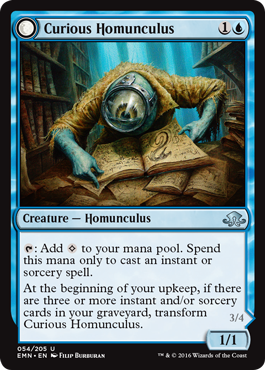
Curious Homunculus
1U
Creature — Homunculus
1/1
T: Add C to your mana pool. Spend this mana only to cast an instant or sorcery spell.
At the beginning of your upkeep, if there are three or more instant and/or sorcery cards in your graveyard, transform Curious Homunculus.
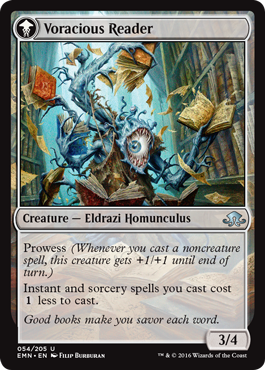
Voracious Reader
Creature — Eldrazi Homunculus
3/4
Prowess (Whenever you cast a noncreature spell, this creature gets +1/+1 until end of turn.)
Instant and sorcery spells you cast cost 1 less to cast.
- If you don’t have enough instant and/or sorcery cards in your graveyard as your upkeep begins, Curious Homunculus’s last ability doesn’t trigger. If you don’t have enough as the ability resolves, the ability has no effect.
- Mana from Curious Homunculus’s first ability can be spent to cast a spell that has generic mana in its additional cost, such as Borrowed Malevolence with both modes chosen. It can’t be spent to pay costs during a spell’s resolution, such as the cost Convolute prompts a player to pay.
- Abilities that reduce the cost of a spell apply after abilities that raise them. For example, Borrowed Malevolence with both modes chosen costs 1B to cast if you control Voracious Reader.
- If an instant or sorcery spell has X in its mana cost, choose the value for X first, and then reduce the cost by 1. For example, Dark Salvation with X chosen as 2 costs 3B to cast if you control Voracious Reader.
- If you activate Curious Homunculus’s mana ability in response to its triggered ability, you can spend that mana to cast an instant spell during your upkeep after it has transformed into Voracious Reader. If you don’t spend the mana, it will leave your mana pool before your draw step begins; you can’t use it to cast the card you draw or to cast a sorcery.
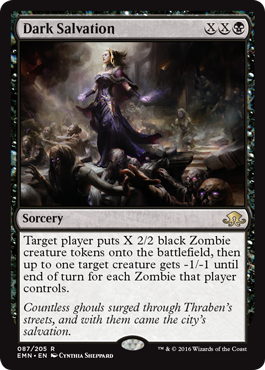
Dark Salvation
XXB
Sorcery
Target player puts X 2/2 black Zombie creature tokens onto the battlefield, then up to one target creature gets -1/-1 until end of turn for each Zombie that player controls.
- You choose up to one target creature total, not a separate target for each Zombie that player controls.
- If the targeted creature becomes an illegal target, the targeted player will still get Zombie tokens.
- You may cast Dark Salvation with X as 0 just to have a creature get -1/-1 for each Zombie a player controls, and you may cast it without targeting any creature just to have a player get Zombie tokens. If you really just want to cast a spell, you can even cast it with X as 0 without a target creature and have neither effect do anything.
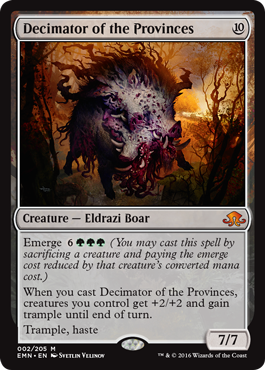
Decimator of the Provinces
10
Creature — Eldrazi Boar
7/7
Emerge 6GGG (You may cast this spell by sacrificing a creature and paying the emerge cost reduced by that creature’s converted mana cost.)
When you cast Decimator of the Provinces, creatures you control get +2/+2 and gain trample until end of turn.
Trample, haste
- The set of creatures affected by the triggered ability is determined as the ability resolves. Creatures you begin to control later in the turn won’t get +2/+2 or trample.
- The triggered ability resolves before Decimator of the Provinces enters the battlefield, so it won’t get +2/+2 from its own triggered ability.
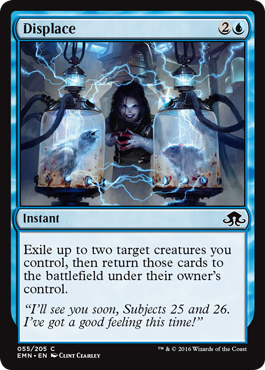
Displace
2U
Instant
Exile up to two target creatures you control, then return those cards to the battlefield under their owner’s control.
- If a creature token is exiled this way, it will cease to exist and will not return to the battlefield.
- After each creature returns to the battlefield, it will be a new object with no connection to the creature that was exiled. It won’t be in combat or have any additional abilities it may have had when it was exiled. Any counters on it cease to exist; Auras attached to it are put into their owner’s graveyards; and any Equipment will become unattached.
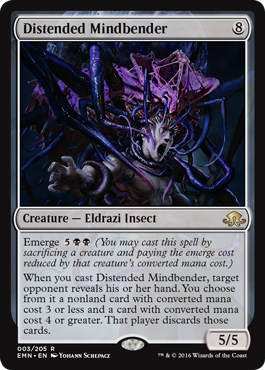
Distended Mindbender
8
Creature — Eldrazi Insect
5/5
Emerge 5BB (You may cast this spell by sacrificing a creature and paying the emerge cost reduced by that creature’s converted mana cost.)
When you cast Distended Mindbender, target opponent reveals his or her hand. You choose from it a nonland card with converted mana cost 3 or less and a card with converted mana cost 4 or greater. That player discards those cards.
- Distended Mindbender’s last ability triggers after you’ve taken all the actions necessary to cast the spell.
- If a card in a player’s hand has X in its mana cost, X is considered to be 0.
- You must choose two appropriate cards if able.
- If there aren’t two appropriate cards to choose, choose whichever you can and that player discards that card.
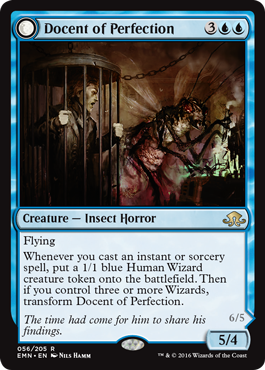
Docent of Perfection
3UU
Creature — Insect Horror
5/4
Flying
Whenever you cast an instant or sorcery spell, put a 1/1 blue Human Wizard creature token onto the battlefield. Then if you control three or more Wizards, transform Docent of Perfection.
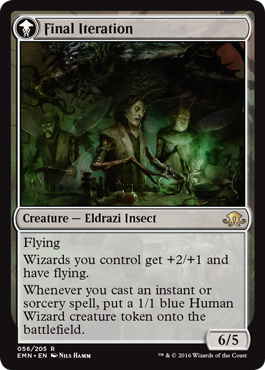
Final Iteration
Creature — Eldrazi Insect
6/5
Flying
Wizards you control get +2/+1 and have flying.
Whenever you cast an instant or sorcery spell, put a 1/1 blue Human Wizard creature token onto the battlefield.
- If you control three or more Wizards while you control Docent of Perfection, it won’t transform yet. It only transforms while its triggered ability is resolving after you cast an instant or sorcery spell.
- Docent of Perfection’s triggered ability resolves before the spell that caused it to trigger. The same is true of Final Iteration’s triggered ability.
- When Docent of Perfection transforms into Final Iteration, the instant or sorcery spell that’s on the stack doesn’t cause Final Iteration’s triggered ability to trigger.
- All Wizards you control get +2/+1 and have flying, not just those created by Docent of Perfection or Final Iteration.
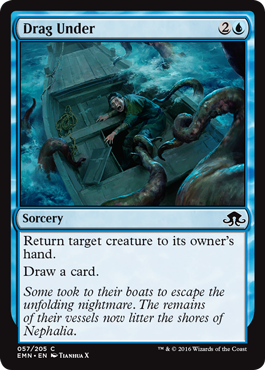
Drag Under
2U
Sorcery
Return target creature to its owner’s hand.
Draw a card.
- If the targeted creature becomes an illegal target before Drag Under resolves, you won’t draw a card.
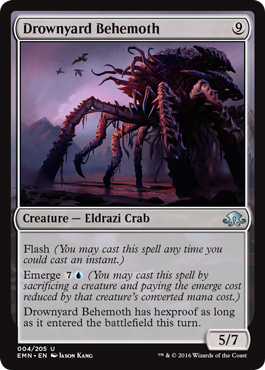
Drownyard Behemoth
9
Creature — Eldrazi Crab
5/7
Flash (You may cast this spell any time you could cast an instant.)
Emerge 7U (You may cast this spell by sacrificing a creature and paying the emerge cost reduced by that creature’s converted mana cost.)
Drownyard Behemoth has hexproof as long as it entered the battlefield this turn.
- There is no moment during the turn Drownyard Behemoth enters the battlefield in which it doesn’t have hexproof. The earliest opportunity for an opponent to target it is during the next turn’s upkeep step.
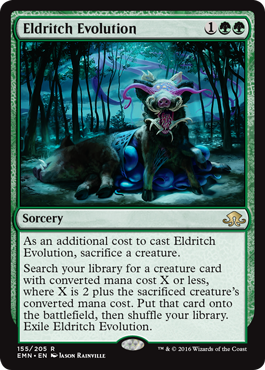
Eldritch Evolution
1GG
Sorcery
As an additional cost to cast Eldritch Evolution, sacrifice a creature.
Search your library for a creature card with converted mana cost X or less, where X is 2 plus the sacrificed creature’s converted mana cost. Put that card onto the battlefield, then shuffle your library. Exile Eldritch Evolution.
- Sacrificing a creature is part of Eldritch Evolution’s cost. You can’t sacrifice more creatures to search for more creature cards, and you can’t cast Eldritch Evolution at all if you control no creatures.
- Once you begin to cast Eldritch Evolution, no player may take actions until you’re done. Notably, opponents can’t try to remove the creature you wish to sacrifice.
- A creature’s converted mana cost is determined solely by the mana symbols printed in its upper right corner (unless that creature is the back face of a double-faced card, a melded card, or is copying something else; see below). If the mana cost includes X, X is considered to be 0. If it’s a single-faced card with no mana symbols in its upper right corner (because it’s an animated land, for example), its converted mana cost is 0. Ignore any alternative costs or additional costs (such as kicker) paid when the creature was cast.
- A token that isn’t a copy of another permanent has a converted mana cost of 0. A token that is a copy or a creature that has become a copy of another permanent has the converted mana cost of what it’s copying.
- The converted mana cost of a permanent that’s a double-faced card with its back face up is the converted mana cost of its front face. The converted mana cost of a melded permanent is the sum of the converted mana costs of its front faces. A creature that’s a copy of either has a converted mana cost of 0.
- If a card in a library has X in its mana cost, X is considered to be 0. If you find such a card this way, you won’t have an opportunity to spend mana on X.
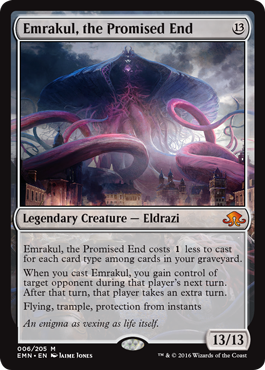
Emrakul, the Promised End
13
Legendary Creature — Eldrazi
13/13
Emrakul, the Promised End costs 1 less to cast for each card type among cards in your graveyard.
When you cast Emrakul, you gain control of target opponent during that player’s next turn. After that turn, that player takes an extra turn.
Flying, trample, protection from instants
- The card types that could appear in your graveyard are artifact, creature, enchantment, instant, land, planeswalker, sorcery, and tribal (a card type that appears on some older cards). Supertypes (such as legendary and basic) and subtypes (such as Human and Equipment) are not counted. The maximum discount that Emrakul’s own ability can provide is 8.
- Protection from instants means that Emrakul can’t be the target of instant spells or activated or triggered abilities from instant cards, and damage that would be dealt to it by instant spells or cards is prevented. Instant spells may still affect it in other ways; for example, it would still receive the bonus from Borrowed Grace.
- Protection abilities only apply while the object with the ability is on the battlefield. Notably, Emrakul may be the target of a spell that targets it while on the stack, such as Convolute.
- While controlling another player, you can see all cards in the game that player can see. This includes cards in that player’s hand, face-down cards that player controls, and any cards in that player’s library the player may look at.
- Controlling a player doesn’t allow you to look at that player’s sideboard. If an effect instructs that player to choose a card from outside the game, you can’t have that player choose any card. This is a change from previous rules.
- The player you’re controlling is still the active player during that turn.
- While controlling another player, you also continue to make your own choices and decisions.
- While controlling another player, you make all choices and decisions that player is allowed to make or is told to make during that turn. This includes choices about what spells to cast or what abilities to activate, as well as any decisions called for by triggered abilities or for any other reason.
- You can’t make the affected player concede. That player may choose to concede at any time, even while you’re controlling that player.
- You can’t make any illegal decisions or illegal choices—you can’t do anything that player couldn’t do. You can’t make choices or decisions for that player that aren’t called for by the game rules or by any cards, permanents, spells, abilities, and so on. If an effect causes another player to make decisions that the affected player would normally make (such as Master Warcraft does), that effect takes precedence. In other words, if the affected player wouldn’t make a decision, you wouldn’t make that decision on that player’s behalf.
- You also can’t make any choices or decisions for the player that would be called for by the tournament rules (such as whether to take an intentional draw or whether to call a judge).
- You can use only the affected player’s resources (cards, mana, and so on) to pay costs for that player; you can’t use your own. Similarly, you can use the affected player’s resources only to pay that player’s costs; you can’t spend them on your costs.
- You only control the player. You don’t control any of that player’s permanents, spells, or abilities.
- If the targeted player skips his or her next turn, you’ll control the next turn the affected player actually takes, and the extra turn the player takes will be after that turn.
- Multiple player-controlling effects that affect the same player overwrite each other. The last one to be created is the one that works. If multiple players have cast Emrakul and targeted the same player, each ability’s effect will create an extra turn.
- If the targeted player loses the game while you control his or her turn during a multiplayer game, no extra turn is created.
- In a Two-Headed Giant game, gaining control of a player causes you to gain control of each player on that team.
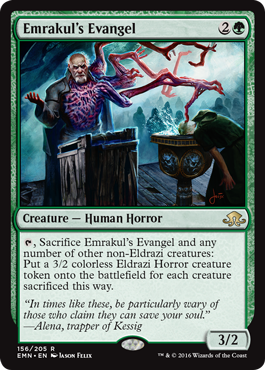
Emrakul’s Evangel
2G
Creature — Human Horror
3/2
T, Sacrifice Emrakul’s Evangel and any number of other non-Eldrazi creatures: Put a 3/2 colorless Eldrazi Horror creature token onto the battlefield for each creature sacrificed this way.
- You may choose to sacrifice no other non-Eldrazi creatures this way. Emrakul’s Evangel’s ability counts itself, so you’ll get one Eldrazi Horror token.
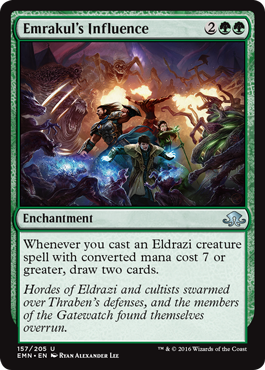
Emrakul’s Influence
2GG
Enchantment
Whenever you cast an Eldrazi creature spell with converted mana cost 7 or greater, draw two cards.
- Emrakul’s Influence doesn’t care about how much mana you paid for an Eldrazi creature spell, only what its converted mana cost is. Cost reductions, such as that of emerge, won’t change whether or not it triggers.
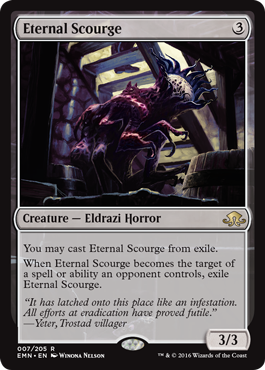
Eternal Scourge
3
Creature — Eldrazi Horror
3/3
You may cast Eternal Scourge from exile.
When Eternal Scourge becomes the target of a spell or ability an opponent controls, exile Eternal Scourge.
- You must follow the normal timing permissions and restrictions and pay its cost to cast Eternal Scourge from exile.
- Eternal Scourge’s triggered ability only triggers while it’s on the battlefield. For example, Convolute cast targeting Eternal Scourge won’t cause its ability to trigger.
- You’ll exile Eternal Scourge even if the spell or ability that targets it is countered.
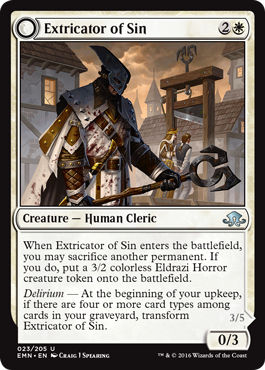
Extricator of Sin
2W
Creature — Human Cleric
0/3
When Extricator of Sin enters the battlefield, you may sacrifice another permanent. If you do, put a 3/2 colorless Eldrazi Horror creature token onto the battlefield.
Delirium — At the beginning of your upkeep, if there are four or more card types among cards in your graveyard, transform Extricator of Sin.
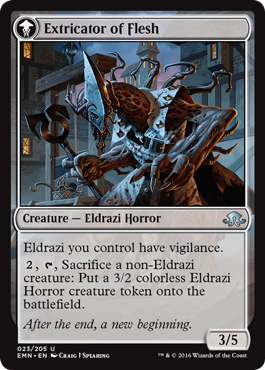
Extricator of Flesh
Creature — Eldrazi Horror
3/5
Eldrazi you control have vigilance.
2, T, Sacrifice a non-Eldrazi creature: Put a 3/2 colorless Eldrazi Horror creature token onto the battlefield.
- While resolving Extricator of Sin’s first ability, you can’t sacrifice multiple permanents to get multiple Eldrazi Horror tokens.
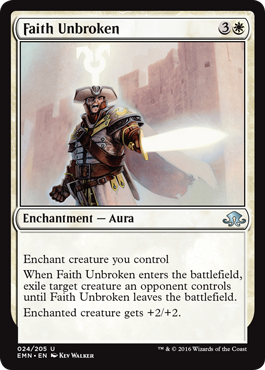
Faith Unbroken
3W
Enchantment — Aura
Enchant creature you control
When Faith Unbroken enters the battlefield, exile target creature an opponent controls until Faith Unbroken leaves the battlefield.
Enchanted creature gets +2/+2.
- If Faith Unbroken leaves the battlefield before its triggered ability resolves, the targeted creature won’t be exiled.
- Auras attached to the exiled creature will be put into their owners’ graveyards. Any Equipment will become unattached and remain on the battlefield. Any counters on the exiled permanent will cease to exist.
- If a token is exiled, it ceases to exist. It won’t be returned to the battlefield.
- The exiled card returns to the battlefield immediately after Faith Unbroken leaves the battlefield. Nothing happens between the two events, including state-based actions. However, if the creature Faith Unbroken enchants leaves the battlefield, Faith Unbroken won’t leave itself until state-based actions are checked.
- In a multiplayer game, if Faith Unbroken’s owner leaves the game, the exiled card will return to the battlefield. Because the one-shot effect that returns the card isn’t an ability that goes on the stack, it won’t cease to exist along with the leaving player’s spells and abilities on the stack.
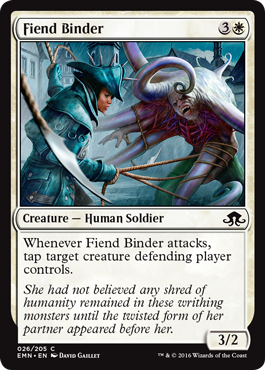
Fiend Binder
3W
Creature — Human Soldier
3/2
Whenever Fiend Binder attacks, tap target creature defending player controls.
- In a multiplayer game, Fiend Binder’s triggered ability can only target a creature controlled by the player it’s attacking (or by the controller of the planeswalker it’s attacking).
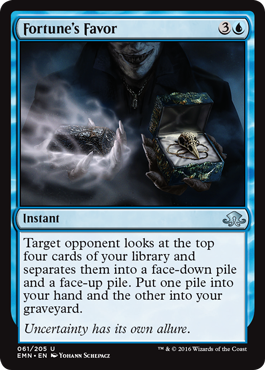
Fortune’s Favor
3U
Instant
Target opponent looks at the top four cards of your library and separates them into a face-down pile and a face-up pile. Put one pile into your hand and the other into your graveyard.
- You choose which pile to put into your hand and which to put into your graveyard. You can’t look at the face-down pile until after it’s moving to its new zone.
- A pile can have no cards in it. In this case, you’ll choose whether to put all the cards into your hand or into your graveyard.
- In a multiplayer game, the targeted opponent may choose what information to share with others if that player wants advice on how to split the cards, but that player doesn’t have to share any information at all.
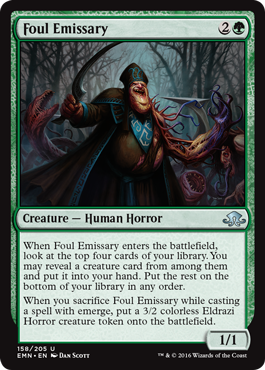
Foul Emissary
2G
Creature — Human Horror
1/1
When Foul Emissary enters the battlefield, look at the top four cards of your library. You may reveal a creature card from among them and put it into your hand. Put the rest on the bottom of your library in any order.
When you sacrifice Foul Emissary while casting a spell with emerge, put a 3/2 colorless Eldrazi Horror creature token onto the battlefield.
- Foul Emissary’s last ability triggers if it’s sacrificed for any reason while you’re casting a spell with emerge, whether or not you’re casting that spell for its emerge cost. For example, if you sacrifice it to activate the ability of Ashnod’s Altar while casting Decimator of the Provinces for 10, its ability will trigger.
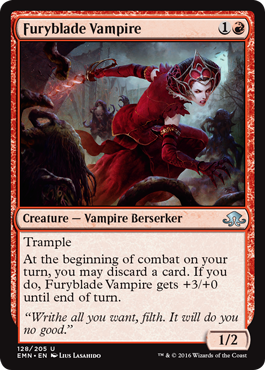
Furyblade Vampire
1R
Creature — Vampire Berserker
1/2
Trample
At the beginning of combat on your turn, you may discard a card. If you do, Furyblade Vampire gets +3/+0 until end of turn.
- While resolving Furyblade Vampire’s triggered ability, you can’t discard multiple cards to multiply the bonus.
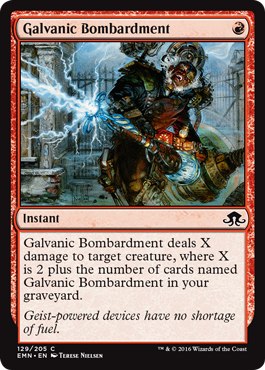
Galvanic Bombardment
R
Instant
Galvanic Bombardment deals X damage to target creature, where X is 2 plus the number of cards named Galvanic Bombardment in your graveyard.
- Because Galvanic Bombardment is still on the stack as you determine the value of X, it is not in your graveyard and will not add to the value of X.
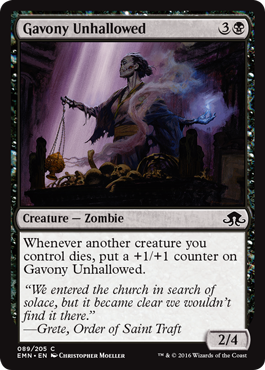
Gavony Unhallowed
3B
Creature — Zombie
2/4
Whenever another creature you control dies, put a +1/+1 counter on Gavony Unhallowed.
- If Gavony Unhallowed and another creature you control die simultaneously (perhaps because they were both attacking or blocking), Gavony Unhallowed won’t be on the battlefield as its triggered ability resolves. It can’t be saved by the +1/+1 counter that would have been put on it.
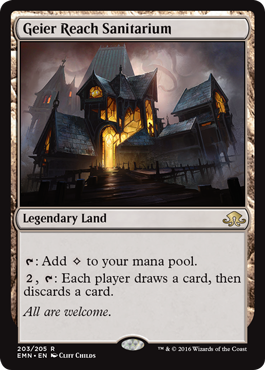
Geier Reach Sanitarium
Legendary Land
T: Add C to your mana pool.
2, T: Each player draws a card, then discards a card.
- When you activate Geier Reach Sanitarium’s last ability, first each player draws a card. Then the player whose turn it is selects a card from his or her hand and sets it aside without revealing it; proceeding in turn order, each other player does the same. Then the cards that were set aside are discarded at once.
- If more than one player discards a card with madness simultaneously, the player whose turn it is puts his or her madness abilities onto the stack first, then each other player does the same in turn order. The last one put onto the stack resolves first, and a spell cast this way will resolve before resolving the next madness ability.
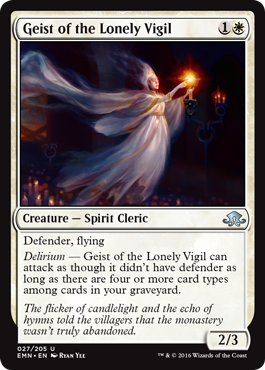
Geist of the Lonely Vigil
1W
Creature — Spirit Cleric
2/3
Defender, flying
Delirium — Geist of the Lonely Vigil can attack as though it didn’t have defender as long as there are four or more card types among cards in your graveyard.
- Once you’ve attacked with Geist of the Lonely Vigil, lowering the number of card types in your graveyard won’t remove it from combat.
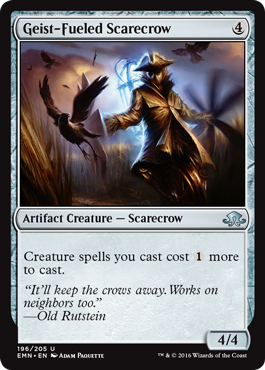
Geist-Fueled Scarecrow
4
Artifact Creature — Scarecrow
4/4
Creature spells you cast cost 1 more to cast.
- Geist-Fueled Scarecrow’s ability applies to creature spells even if you’re casting them for an alternative cost (such as that of emerge). If you cast a creature spell without paying its mana cost, you’ll still have to pay 1.
- Abilities that reduce the cost of a spell apply after abilities that raise them. For example, Bedlam Reveler will cost RR to cast if you have seven instant and sorcery cards in your graveyard while you control Geist-Fueled Scarecrow.
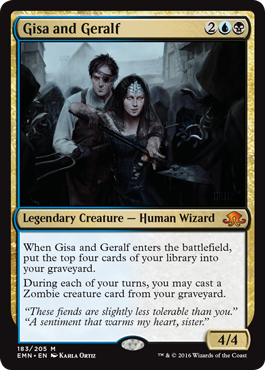
Gisa and Geralf
2UB
Legendary Creature — Human Wizard
4/4
When Gisa and Geralf enters the battlefield, put the top four cards of your library into your graveyard.
During each of your turns, you may cast a Zombie creature card from your graveyard.
- You must follow the normal timing permissions and restrictions of the Zombie card you cast from your graveyard.
- You must pay the costs to cast that Zombie card. If it has an alternative cost, you may cast it for that cost instead.
- Once you begin to cast the Zombie card, losing control of Gisa and Geralf won’t affect the spell.
- If you cast one Zombie creature card from your graveyard and then have a new Gisa and Geralf come under your control in the same turn, you may cast another Zombie creature card from your graveyard that turn.
- If a Zombie card is put into your graveyard during your main phase and the stack is empty, you have a chance to cast it before any player may attempt to remove that card from your graveyard.
- If multiple effects allow you to cast a Zombie creature card from your graveyard, such as those of Gisa and Geralf and Karador, Ghost Chieftain, you must announce which permission you’re using as you begin to cast the spell.
- Even though the cards portray the same characters, Gisa and Geralf has a different name than Ghoulcaller Gisa and Stitcher Geralf. Controlling Gisa and Geralf along with Ghoulcaller Gisa or Stitcher Geralf won’t invoke the “legend rule."
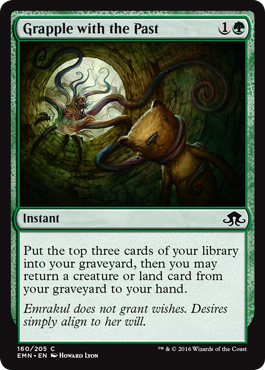
Grapple with the Past
1G
Instant
Put the top three cards of your library into your graveyard, then you may return a creature or land card from your graveyard to your hand.
- Grapple with the Past doesn’t target the card to return to your hand. After putting the top three cards of your library into your graveyard, you may choose from among any creature or land cards there.
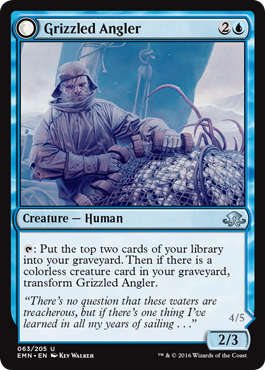
Grizzled Angler
2U
Creature — Human
2/3
T: Put the top two cards of your library into your graveyard. Then if there is a colorless creature card in your graveyard, transform Grizzled Angler.
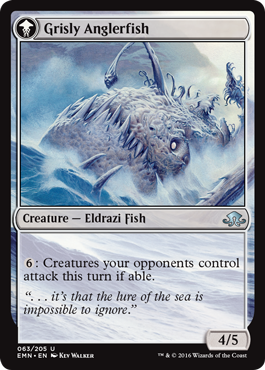
Grisly Anglerfish
Creature — Eldrazi Fish
4/5
6: Creatures your opponents control attack this turn if able.
- If you have a colorless creature card in your graveyard while you control Grizzled Angler, it won’t transform yet. It only transforms while its activated ability is resolving.
- If a creature affected by Grisly Anglerfish’s effect hasn’t been under its controller’s control since the turn began, is tapped, or is affected by a spell or ability that says it can’t attack, then it doesn’t attack. If there’s a cost associated with having that creature attack, its controller isn’t forced to pay that cost, so it doesn’t have to attack in that case either.
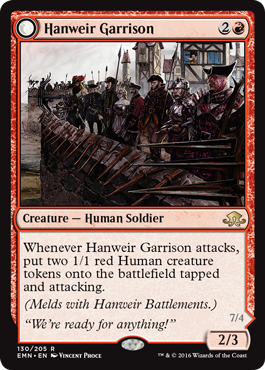
Hanweir Garrison
2R
Creature — Human Soldier
2/3
Whenever Hanweir Garrison attacks, put two 1/1 red Human creature tokens onto the battlefield tapped and attacking.
(Melds with Hanweir Battlements.)
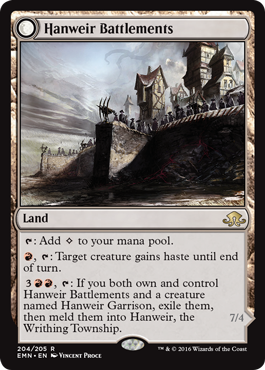
Hanweir Battlements
Land
T: Add C to your mana pool.
R, T: Target creature gains haste until end of turn.
3RR, T: If you both own and control Hanweir Battlements and a creature named Hanweir Garrison, exile them, then meld them into Hanweir, the Writhing Township.
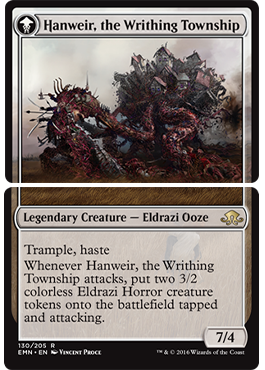
Hanweir, the Writhing Township
Legendary Creature — Eldrazi Ooze
7/4
Trample, haste
Whenever Hanweir, the Writhing Township attacks, put two 3/2 colorless Eldrazi Horror creature tokens onto the battlefield tapped and attacking.
- You choose which opponent or planeswalker controlled by an opponent each token is attacking as it enters the battlefield. It doesn’t have to be the same opponent or planeswalker that the trigger’s source is attacking, and the tokens don’t both have to attack the same player or planeswalker.
- On the turn they enter the battlefield, the tokens are never declared as attacking creatures. They simply enter the battlefield attacking. They won’t cause any abilities that trigger “whenever a creature attacks” to trigger.
- If another ability of a source you control triggers when attackers are declared, such as that of Hamlet Captain, you may have it resolve before or after that of Hanweir Garrison or Hanweir, the Writhing Township. If that ability has targets, it won’t be able to target the tokens.
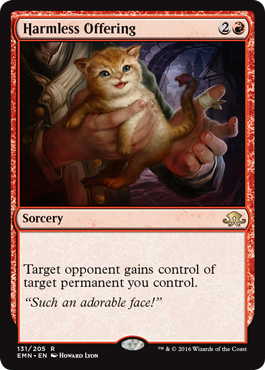
Harmless Offering
2R
Sorcery
Target opponent gains control of target permanent you control.
- Your opponent can’t refuse your generous donation.
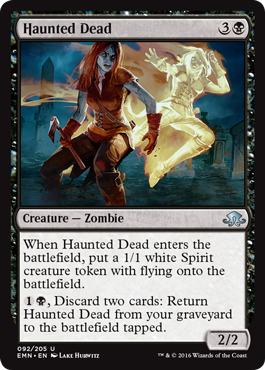
Haunted Dead
3B
Creature — Zombie
2/2
When Haunted Dead enters the battlefield, put a 1/1 white Spirit creature token with flying onto the battlefield.
1B, Discard two cards: Return Haunted Dead from your graveyard to the battlefield tapped.
- Haunted Dead’s last ability can only be activated while it’s in your graveyard.
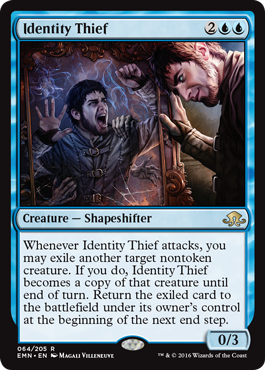
Identity Thief
2UU
Creature — Shapeshifter
0/3
Whenever Identity Thief attacks, you may exile another target nontoken creature. If you do, Identity Thief becomes a copy of that creature until end of turn. Return the exiled card to the battlefield under its owner’s control at the beginning of the next end step.
- If the targeted creature has an ability that triggers when it attacks, it’ll be too late for it to trigger once Identity Thief has that ability. The same is true if another object has an ability that triggers when a creature with certain characteristics attacks and Identity Thief doesn’t have those characteristics until after it becomes a copy.
- Identity Thief copies the printed values of the targeted creature, plus any copy effects that have been applied to that creature. It won’t copy other effects that have changed the targeted creature’s power, toughness, types, color, or so on. It also won’t copy counters on the targeted creature.
- If the targeted creature is a double-faced or melded permanent, Identity Thief copies the face shown. Because Identity Thief is not a double-faced card or meld card, it won’t be able to transform or meld. If it copies a melded permanent or the back face of a double-faced card, its converted mana cost will be 0. Exiled double-faced cards and exiled meld cards will return with their front faces up.
- If the targeted creature is itself copying a permanent, Identity Thief will become whatever it’s copying, as modified by that copy effect. For example, if you target a Hamlet Captain that has become a copy of Permeating Mass, Identity Thief will become a Permeating Mass.
- This effect can cause Identity Thief to stop being a creature. For example, if you target an animated Gideon Jura (a planeswalker with a loyalty ability that turns him into a creature), only the printed wording will be copied; the “becomes a creature” effect won’t. Identity Thief will become a noncreature Gideon with no loyalty, be removed from combat, and then be put into its owner’s graveyard.
- This effect can cause Identity Thief to become a copy of a creature that can’t normally attack, such as Lupine Prototype or a creature with defender. In these cases, it remains attacking.
- Noncopy effects that have already applied to Identity Thief will continue to apply to it. For example, if Woodcutter’s Grit gave Identity Thief +3/+3 and hexproof earlier in the turn, Identity Thief will still have those bonuses after copying a creature.
- Identity Thief will still be a copy of the creature during the next end step when the exiled card returns. If it has an ability that triggers at the beginning of the end step, that ability will trigger for Identity Thief and not for the returned creature.
- Auras attached to the exiled creature will be put into their owners’ graveyards. Any Equipment will become unattached and remain on the battlefield. Any counters on the exiled permanent will cease to exist.
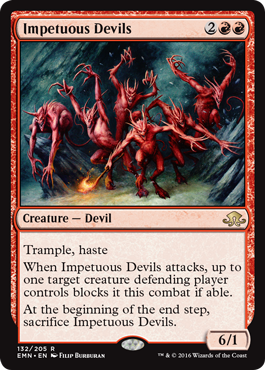
Impetuous Devils
2RR
Creature — Devil
6/1
Trample, haste
When Impetuous Devils attacks, up to one target creature defending player controls blocks it this combat if able.
At the beginning of the end step, sacrifice Impetuous Devils.
- If a creature affected by the first triggered ability of Impetuous Devils is tapped or is affected by a spell or ability that says it can’t block, then it doesn’t block. If there’s a cost associated with having that creature block, its controller isn’t forced to pay that cost, so it doesn’t have to block in that case either.
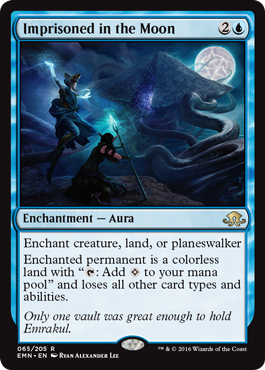
Imprisoned in the Moon
2U
Enchantment — Aura
Enchant creature, land, or planeswalker
Enchanted permanent is a colorless land with “T: Add C to your mana pool” and loses all other card types and abilities.
- At the time the permanent becomes enchanted, Imprisoned in the Moon causes it to lose all abilities except the noted mana ability. Any abilities the permanent gains after that point will work normally.
- The permanent will keep any supertypes it previously had. Notably, if Imprisoned in the Moon is enchanting a legendary permanent, that permanent will continue to be legendary.
- If the enchanted permanent is a land and has land types, it retains those types even though it loses any intrinsic mana abilities associated with them. For example, a Plains enchanted by Imprisoned in the Moon is still a Plains, but it can’t tap for W, only for C.
- If you remove Imprisoned in the Moon from a planeswalker after tapping it for mana, you can still activate a loyalty ability of that planeswalker even though it’s tapped.
- Becoming a land may cause other Auras to become illegally attached. These are put into their owner’s graveyard, and any Equipment attached to the land become unattached and remain on the battlefield. Counters on the land remain on it even if they don’t do anything.
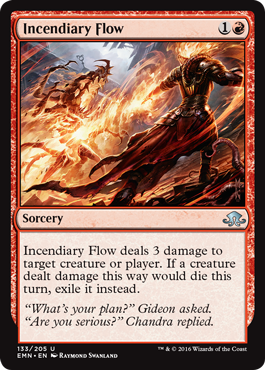
Incendiary Flow
1R
Sorcery
Incendiary Flow deals 3 damage to target creature or player. If a creature dealt damage this way would die this turn, exile it instead.
- The damaged creature will be exiled if it would die for any reason that turn, not just if it dies due to damage from Incendiary Flow.
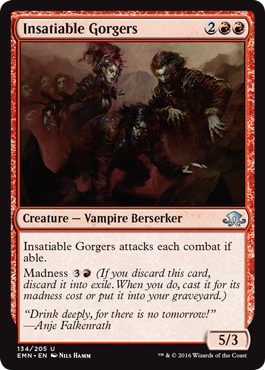
Insatiable Gorgers
2RR
Creature — Vampire Berserker
5/3
Insatiable Gorgers attacks each combat if able.
Madness 3R (If you discard this card, discard it into exile. When you do, cast it for its madness cost or put it into your graveyard.)
- If Insatiable Gorgers hasn’t been under your control since the turn began, is tapped, or is affected by a spell or ability that says it can’t attack, then it doesn’t attack. If there’s a cost associated with having it attack, you aren’t forced to pay that cost, so it doesn’t have to attack in that case either.
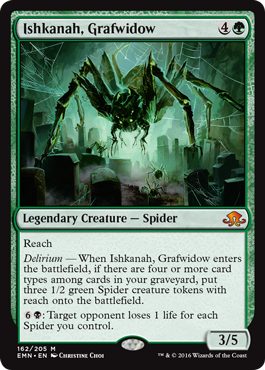
Ishkanah, Grafwidow
4G
Legendary Creature — Spider
3/5
Reach
Delirium — When Ishkanah, Grafwidow enters the battlefield, if there are four or more card types among cards in your graveyard, put three 1/2 green Spider creature tokens with reach onto the battlefield.
6B: Target opponent loses 1 life for each Spider you control.
- The number of Spiders you control is checked only as Ishkanah’s last ability resolves. The ability will count Ishkanah itself if it’s still on the battlefield.
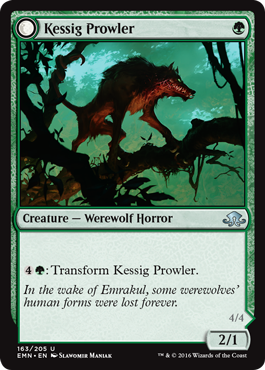
Kessig Prowler
G
Creature — Werewolf Horror
2/1
4G: Transform Kessig Prowler.
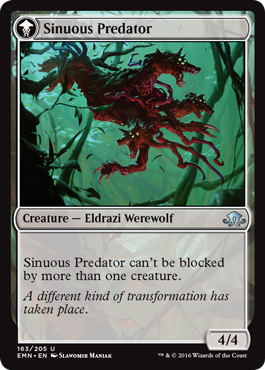
Sinuous Predator
Creature — Eldrazi Werewolf
4/4
Sinuous Predator can’t be blocked by more than one creature.
- If Sinuous Predator gains menace, it can’t be blocked by only one creature and it can’t be blocked by more than one creature, so it simply can’t be blocked.
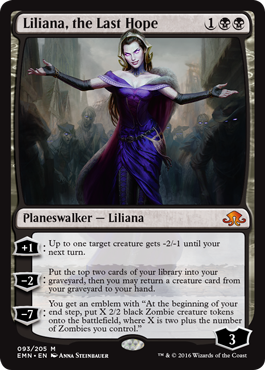
Liliana, the Last Hope
1BB
Planeswalker — Liliana
3
+1: Up to one target creature gets -2/-1 until your next turn.
−2: Put the top two cards of your library into your graveyard, then you may return a creature card from your graveyard to your hand.
−7: You get an emblem with “At the beginning of your end step, put X 2/2 black Zombie creature tokens onto the battlefield, where X is two plus the number of Zombies you control."
- You can activate Liliana’s first ability without any targets just to add a loyalty counter to her.
- Liliana’s second ability doesn’t target the card to return to your hand. After putting the top two cards of your library into your graveyard, you may choose from among any creature cards there.
- While resolving the triggered ability of Liliana’s emblem, if you control zero Zombies, you’ll get two Zombie tokens.
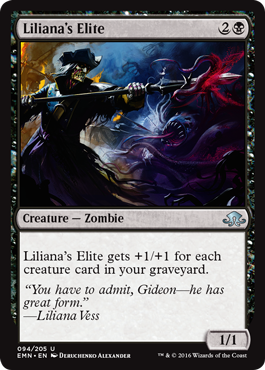
Liliana’s Elite
2B
Creature — Zombie
1/1
Liliana’s Elite gets +1/+1 for each creature card in your graveyard.
- The ability applies only while Liliana’s Elite on the battlefield.
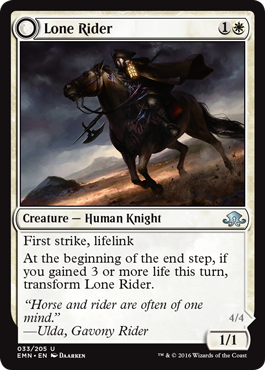
Lone Rider
1W
Creature — Human Knight
1/1
First strike, lifelink
At the beginning of the end step, if you gained 3 or more life this turn, transform Lone Rider.
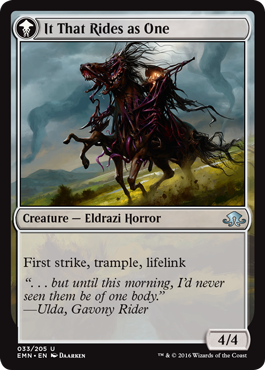
It That Rides as One
Creature — Eldrazi Horror
4/4
First strike, trample, lifelink
- Lone Rider’s last ability triggers even if it wasn’t on the battlefield when you gained the life this turn.
- Lone Rider’s ability checks how much life you’ve gained during the turn, not what your life total is compared to what it was when the turn began. For example, if you gained 4 life and then lost 7 life this turn, it still triggers.
- You must have gained life before your end step begins. Lone Rider’s last ability won’t trigger if you haven’t, even if an ability triggering at the same time will cause you to gain life.
- In a Two-Headed Giant game, events that cause a player to gain life affect each player separately, even though the result affects the team’s life total. For example, if your teammate’s creatures with lifelink dealt 5 damage, your teammate gained life, not you, and Lone Rider’s last ability won’t trigger.
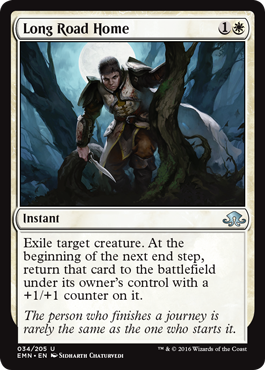
Long Road Home
1W
Instant
Exile target creature. At the beginning of the next end step, return that card to the battlefield under its owner’s control with a +1/+1 counter on it.
- If that creature is exiled during an end step, it won’t come back until the next turn’s end step.
- If a creature token is exiled this way, it will cease to exist and won’t return to the battlefield.
- At the time the creature is exiled, Auras attached to it will be put into their owners’ graveyards. Any Equipment will become unattached and remain on the battlefield. Any counters on it at that time will cease to exist.
- If a double-faced card is exiled this way, it’ll return with its front face up. It gets a +1/+1 counter even if it isn’t a creature.
- If a melded permanent is exiled this way, the two cards will both return with their front faces up. Each gets a +1/+1 counter.
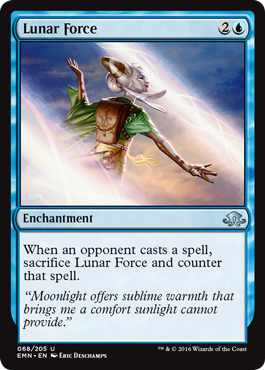
Lunar Force
2U
Enchantment
When an opponent casts a spell, sacrifice Lunar Force and counter that spell.
- You can’t choose not to sacrifice Lunar Force.
- You sacrifice Lunar Force even if the spell’s already been countered, perhaps by the ability of another Lunar Force, or if the spell can’t be countered.
- The spell will be countered even if Lunar Force can’t be sacrificed, most likely because it has already left the battlefield. Casting a spell in response to an opponent’s Lunar Force’s triggered ability is generally a bad idea.
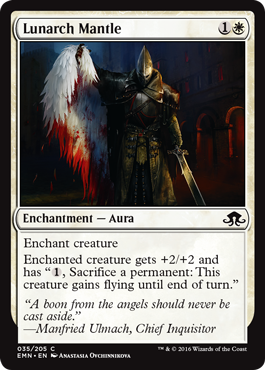
Lunarch Mantle
1W
Enchantment — Aura
Enchant creature
Enchanted creature gets +2/+2 and has “1, Sacrifice a permanent: This creature gains flying until end of turn."
- Only the enchanted creature’s controller can activate Lunarch Mantle’s ability.
- You can activate the ability Lunarch Mantle grants to your enchanted creature by sacrificing any permanent, including Lunarch Mantle or the enchanted creature itself.
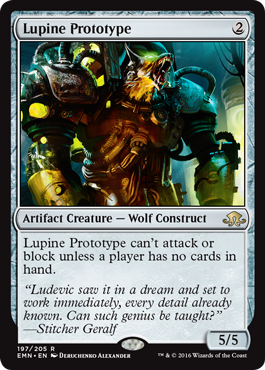
Lupine Prototype
2
Artifact Creature — Wolf Construct
5/5
Lupine Prototype can’t attack or block unless a player has no cards in hand.
- Lupine Prototype’s restriction applies only at the moment that attackers and blockers are chosen. If a player puts a card into his or her hand after Lupine Prototype has attacked or blocked, it won’t be removed from combat.
- If a creature can’t attack or block unless you return a permanent to your hand, and your hand is empty, you can attack or block with that creature and Lupine Prototype. This is because the legality of chosen attackers and blockers is checked before costs are paid.
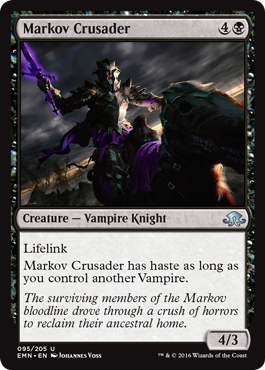
Markov Crusader
4B
Creature — Vampire Knight
4/3
Lifelink
Markov Crusader has haste as long as you control another Vampire.
- If Markov Crusader loses haste before the declare attackers step on the turn it enters the battlefield, it won’t be able to attack. Once you’ve attacked with Markov Crusader, causing it to lose haste won’t remove it from combat.
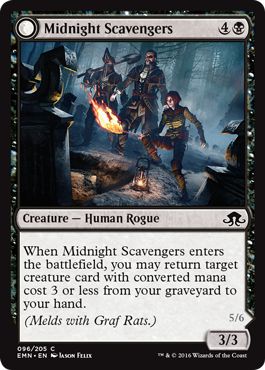
Midnight Scavengers
4B
Creature — Human Rogue
3/3
When Midnight Scavengers enters the battlefield, you may return target creature card with converted mana cost 3 or less from your graveyard to your hand.
(Melds with Graf Rats.)
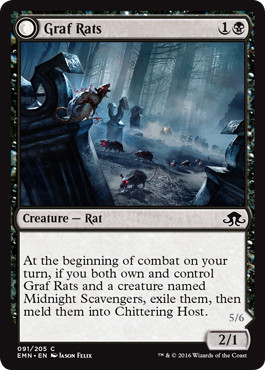
Graf Rats
1B
Creature — Rat
2/1
At the beginning of combat on your turn, if you both own and control Graf Rats and a creature named Midnight Scavengers, exile them, then meld them into Chittering Host.
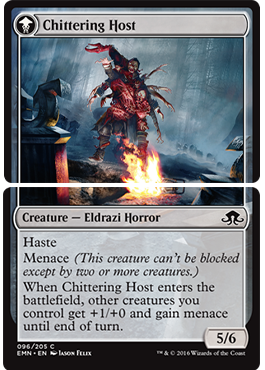
Chittering Host
Creature — Eldrazi Horror
5/6
Haste
Menace (This creature can’t be blocked except by two or more creatures.)
When Chittering Host enters the battlefield, other creatures you control get +1/+0 and gain menace until end of turn.
- If a card in a player’s graveyard has X in its mana cost, X is considered to be 0.
- The set of creatures affected by Chittering Host’s triggered ability is determined as the ability resolves. Creatures you begin to control later in the turn won’t get +1/+0 or gain menace.
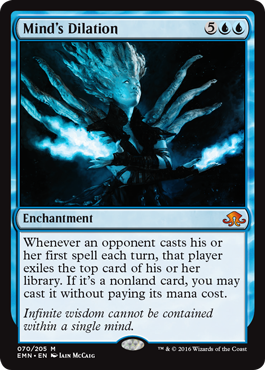
Mind’s Dilation
5UU
Enchantment
Whenever an opponent casts his or her first spell each turn, that player exiles the top card of his or her library. If it’s a nonland card, you may cast it without paying its mana cost.
- If you cast the exiled card, you do so as part of the resolution of Mind’s Dilation’s ability. You can’t wait to cast it later in the turn. Timing permissions based on the card’s type are ignored, but other restrictions (such as “Cast [this card] only during combat”) are not.
- If you cast a card “without paying its mana cost," you can’t pay any alternative costs, such as emerge costs. You can, however, pay additional costs, such as escalate costs. If the card has any mandatory additional costs, you must pay those.
- If the card has X in its mana cost, you must choose 0 as the value of X when casting it without paying its mana cost.
- If you cast the card this way, it will resolve before the spell that caused Mind’s Dilation’s ability to trigger.
- If you cast an instant or sorcery card this way, it goes to its owner’s graveyard as normal. It doesn’t return to exile.
- If you don’t cast the card, perhaps because you choose not to or because it’s a land card, it remains exiled.
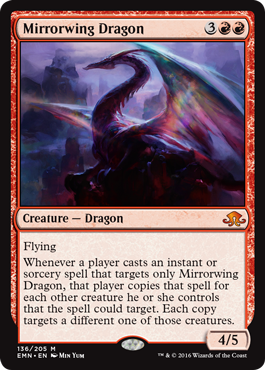
Mirrorwing Dragon
3RR
Creature — Dragon
4/5
Flying
Whenever a player casts an instant or sorcery spell that targets only Mirrorwing Dragon, that player copies that spell for each other creature he or she controls that the spell could target. Each copy targets a different one of those creatures.
- The copies are only created targeting creatures that the spell’s controller controls. Copies are not created for all creatures on the battlefield, and the affected creatures may be controlled by a different player than the controller of Mirrorwing Dragon. Notably, if you cast Murder targeting your opponent’s Mirrorwing Dragon, your creatures will each get a Murder, not your opponent’s.
- The ability triggers whenever a player casts an instant or sorcery spell that targets only Mirrorwing Dragon and no other object or player.
- If a player casts an instant or sorcery spell that has multiple targets and Mirrorwing Dragon is chosen as the target in each instance, Mirrorwing Dragon’s ability will trigger. Each of the copies will similarly be targeting only one of the player’s other creatures.
- Any creature the player controls that couldn’t be targeted by the original spell (due to shroud, protection abilities, targeting restrictions, or any other reason) is just ignored by Mirrorwing Dragon’s ability. If the spell has multiple targets, a given creature must be a legal target for all of them or else a copy won’t be created for that creature.
- The player who cast the original spell controls all the copies. That player chooses the order the copies are put onto the stack. The original spell will be on the stack beneath those copies and will resolve last.
- The copies that the ability creates are created on the stack, so they’re not cast. Abilities that trigger when a player casts a spell (like Mirrorwing Dragon’s ability itself) won’t trigger.
- If the spell that’s copied is modal (that is, it says “Choose one —" or the like), the copies will have the same mode. A different mode cannot be chosen.
- If the spell that’s copied has an X whose value was determined as it was cast (like Burn from Within does), the copies have the same value of X.
- The controller of a copy can’t choose to pay any alternative or additional costs for the copy. However, effects based on any alternative or additional costs that were paid for the original spell are copied as though those same costs were paid for the copy.
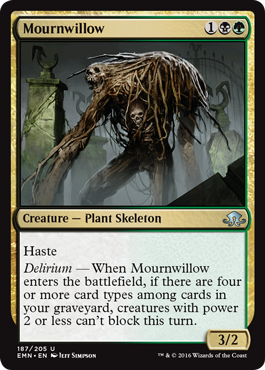
Mournwillow
1BG
Creature — Plant Skeleton
3/2
Haste
Delirium — When Mournwillow enters the battlefield, if there are four or more card types among cards in your graveyard, creatures with power 2 or less can’t block this turn.
- Because the last ability’s effect doesn’t change the characteristics of any permanents, the set of creatures affected is constantly updated. Any creature with power 2 or less at the moment blockers are chosen will be unable to block.
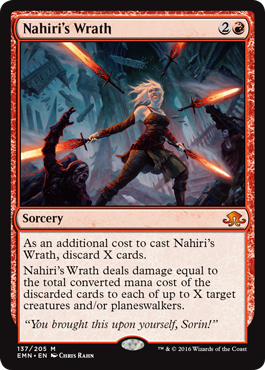
Nahiri’s Wrath
2R
Sorcery
As an additional cost to cast Nahiri’s Wrath, discard X cards.
Nahiri’s Wrath deals damage equal to the total converted mana cost of the discarded cards to each of up to X target creatures and/or planeswalkers.
- Nahiri’s Wrath adds the converted mana costs of the discarded cards in whatever zone they were put into as a result of being discarded, even if they weren’t put into a graveyard (due to madness, for example) or are no longer in that zone.
- The damage is not divided. Nahiri’s Wrath will deal that much damage to each target.
- You can’t target the same creature or planeswalker multiple times to deal more damage to it.
- If you discard a card with X in its mana cost, X is considered to be 0.
- If you cast Nahiri’s Wrath without paying its mana cost, you’ll still choose a value for X and discard X cards.
- If you copy Nahiri’s Wrath, it has the same number of targets and deals the same amount of damage as the original spell.
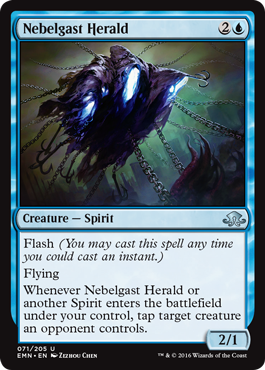
Nebelgast Herald
2U
Creature — Spirit
2/1
Flash (You may cast this spell any time you could cast an instant.)
Flying
Whenever Nebelgast Herald or another Spirit enters the battlefield under your control, tap target creature an opponent controls.
- If Nebelgast Herald and another Spirit enter the battlefield at the same time, Nebelgast Herald’s last ability triggers once for each.
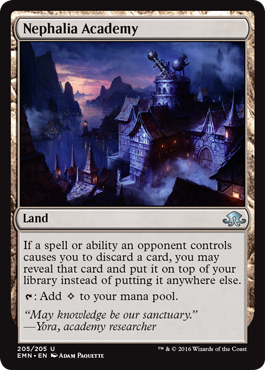
Nephalia Academy
Land
If a spell or ability an opponent controls causes you to discard a card, you may reveal that card and put it on top of your library instead of putting it anywhere else.
T: Add C to your mana pool.
- In a Magic game, cards are discarded only from a player’s hand. Effects that put cards from a player’s library into that player’s graveyard do not cause those cards to be discarded.
- When you apply Nephalia Academy’s effect, the card was still discarded. Abilities that trigger when a card is discarded will still trigger.
- If a spell or ability an opponent controls causes you to make a choice and you choose to discard a card, Nephalia Academy’s ability will apply.
- If you discard a card with madness, you’ll choose whether to exile it or put it on top of your library. If you put it on top of your library, you can’t cast it using madness.
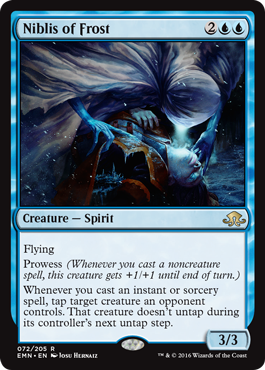
Niblis of Frost
2UU
Creature — Spirit
3/3
Flying
Prowess (Whenever you cast a noncreature spell, this creature gets +1/+1 until end of turn.)
Whenever you cast an instant or sorcery spell, tap target creature an opponent controls. That creature doesn’t untap during its controller’s next untap step.
- If multiple effects say that a creature doesn’t untap during its controller’s next untap step, those effects all apply during one untap step. For example, if you cast two instants in one turn and target the same creature twice with Niblis of Frost’s ability, that creature will only spend one untap step without untapping.
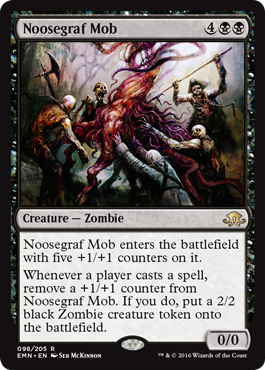
Noosegraf Mob
4BB
Creature — Zombie
0/0
Noosegraf Mob enters the battlefield with five +1/+1 counters on it.
Whenever a player casts a spell, remove a +1/+1 counter from Noosegraf Mob. If you do, put a 2/2 black Zombie creature token onto the battlefield.
- If Noosegraf Mob is no longer on the battlefield or no longer has +1/+1 counters on it as its triggered ability resolves, you can’t remove a counter from it and won’t get a Zombie token.
- You can’t remove more than one +1/+1 counter from Noosegraf Mob at once to get more Zombie tokens, and you can’t choose not to remove a counter.
- Noosegraf Mob’s triggered ability resolves before the spell that caused it to trigger.
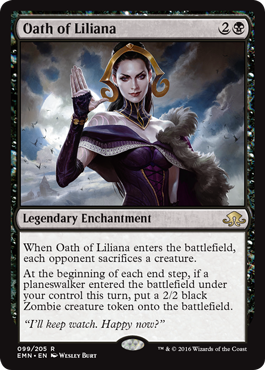
Oath of Liliana
2B
Legendary Enchantment
When Oath of Liliana enters the battlefield, each opponent sacrifices a creature.
At the beginning of each end step, if a planeswalker entered the battlefield under your control this turn, put a 2/2 black Zombie creature token onto the battlefield.
- Oath of Liliana’s last ability will trigger even if the planeswalker that entered the battlefield under your control is no longer on the battlefield, no longer under your control, or no longer a planeswalker. This is also true if Oath of Liliana wasn’t on the battlefield when the planeswalker entered.
- The last ability triggers only once per turn, even if more than one planeswalker entered the battlefield under your control.
- Oath of Liliana is legendary, just like the previous Oaths from Oath of the Gatewatch. If you already control an Oath of Liliana, you can still cast a second Oath of Liliana to take advantage of its enters-the-battlefield ability. It will enter the battlefield, causing its first ability to trigger. You will then choose one to keep, and the other will be put into your graveyard.
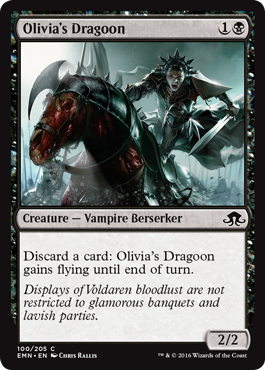
Olivia’s Dragoon
1B
Creature — Vampire Berserker
2/2
Discard a card: Olivia’s Dragoon gains flying until end of turn.
- You can activate the ability more than once in a turn, even if Olivia’s Dragoon already has flying.
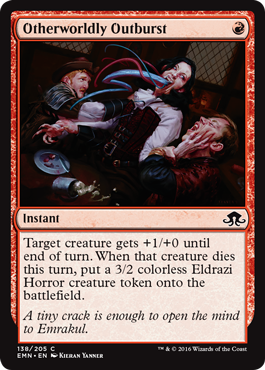
Otherworldly Outburst
R
Instant
Target creature gets +1/+0 until end of turn. When that creature dies this turn, put a 3/2 colorless Eldrazi Horror creature token onto the battlefield.
- If the targeted creature doesn’t die this turn, the delayed triggered ability simply won’t trigger.
- If the targeted creature dies before Otherworldly Outburst resolves, the spell is countered. You won’t get an Eldrazi Horror token.
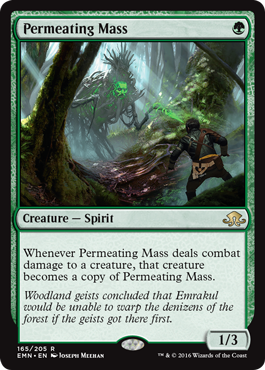
Permeating Mass
G
Creature — Spirit
1/3
Whenever Permeating Mass deals combat damage to a creature, that creature becomes a copy of Permeating Mass.
- A creature dealt lethal damage during combat won’t survive long enough to become a copy of Permeating Mass. If Permeating Mass is dealt lethal damage during combat, the creature Permeating Mass dealt damage to still becomes a copy of it.
- A creature with 3 or more damage marked on it that becomes a copy of Permeating Mass will be destroyed immediately after becoming a copy.
- The damaged creature copies the printed values of Permeating Mass. It won’t copy counters on Permeating Mass or effects that have changed its power, toughness, types, color, or so on. Notably, this means that a creature that becomes a copy of Permeating Mass has the ability to permeate other creatures as well.
- If Permeating Mass becomes a copy of another creature before its triggered ability resolves, the damaged creature will become a copy of that creature.
- Effects that have already applied to the damaged creature will continue to apply to it. For example, if Giant Growth had given it +3/+3 earlier in the turn, it will be 4/6.
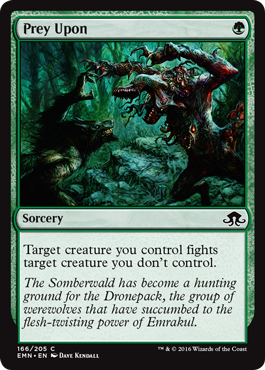
Prey Upon
G
Sorcery
Target creature you control fights target creature you don’t control.
- If either or both targets are illegal when Prey Upon tries to resolve, no creature will deal or be dealt damage.
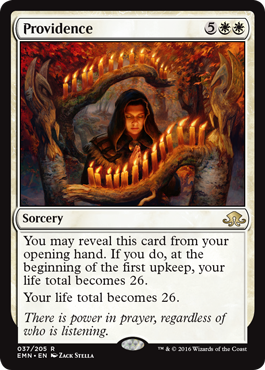
Providence
5WW
Sorcery
You may reveal this card from your opening hand. If you do, at the beginning of the first upkeep, your life total becomes 26.
Your life total becomes 26.
- For a player’s life total to become 26, the player gains or loses the appropriate amount of life. For example, if your life total is 4 when Providence resolves, it will cause you to gain 22 life; alternatively, if your life total is 40 when it resolves, it will cause you to lose 14 life. Other cards that interact with life gain or life loss will interact with this effect accordingly.
- Your “opening hand” is the hand of cards you decide to start the game with after taking any mulligans.
- A player’s “opening hand” is the hand of cards the player has after all players have taken mulligans and "scryed” if applicable. If players have any cards in hand that allow actions to be taken with them from a player’s opening hand, the starting player takes all such actions first in any order, followed by each other player in turn order. Then the first turn begins.
- Revealing multiples of Providence from your opening hand won’t cause your life total to become 32 or any number other than 26.
- In a Two-Headed Giant game, Providence causes the team’s life total to become 26, but only you actually gain or lose life. (Each team’s starting life total in a Two-Headed Giant game is normally 30.)
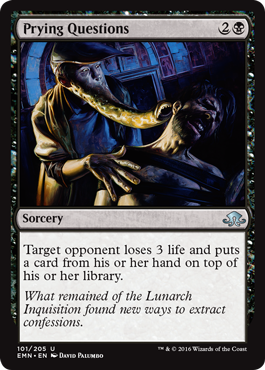
Prying Questions
2B
Sorcery
Target opponent loses 3 life and puts a card from his or her hand on top of his or her library.
- Prying Questions can target an opponent who has no cards in hand. That player just loses 3 life.
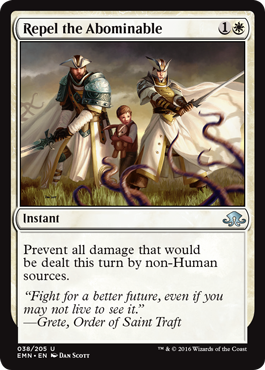
Repel the Abominable
1W
Instant
Prevent all damage that would be dealt this turn by non-Human sources.
- Sources that have no creature type at all are non-Human sources, as are sources with creature types that don’t include Human. A creature that is Human and has other types, such as a Human Werewolf, is still a Human source.
- If a spell or ability causes damage to be dealt, it will indicate what object deals the damage. The object dealing damage might not be the spell itself.
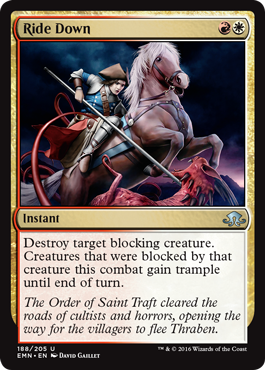
Ride Down
RW
Instant
Destroy target blocking creature. Creatures that were blocked by that creature this combat gain trample until end of turn.
- The attacking creatures that the destroyed creature was blocking remain blocked (even if no other creatures were blocking them). An attacking creature with trample that has no creature blocking it will deal its combat damage to the defending player or planeswalker.
- In some rare cases, the blocking creature wasn’t declared as a blocking creature that combat (for example, if it entered the battlefield blocking). In that case, the attacking creatures it was blocking won’t gain trample even though the blocking creature is destroyed.
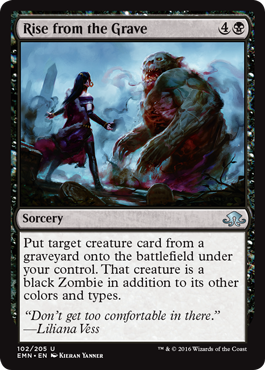
Rise from the Grave
4B
Sorcery
Put target creature card from a graveyard onto the battlefield under your control. That creature is a black Zombie in addition to its other colors and types.
- If the targeted creature card is normally colorless, it will simply become black. It won’t be both black and colorless.
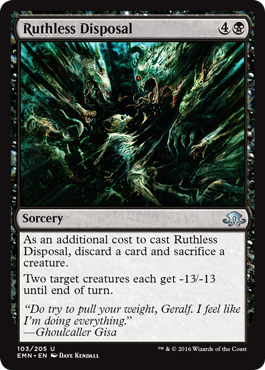
Ruthless Disposal
4B
Sorcery
As an additional cost to cast Ruthless Disposal, discard a card and sacrifice a creature.
Two target creatures each get -13/-13 until end of turn.
- Discarding a card and sacrificing a creature are both part of Ruthless Disposal’s cost. You can’t discard or sacrifice more to target more creatures, and you can’t cast Ruthless Disposal at all if you don’t have any other cards in hand or if you control no creatures.
- There’s no way to discard a creature card with madness, cast it, and sacrifice it to pay for both of Ruthless Disposal’s additional costs.
- Once you begin to cast Ruthless Disposal, no player may take actions until you’re done. Notably, opponents can’t try to remove the creature you wish to sacrifice.
- You must target exactly two creatures to cast Ruthless Disposal. However, one of the targets can be the creature you intend to sacrifice to pay Ruthless Disposal’s cost.
- If one targeted creature becomes an illegal target, the other will still get -13/-13 until end of turn.
- You can’t target one creature twice to give it -26/-26.
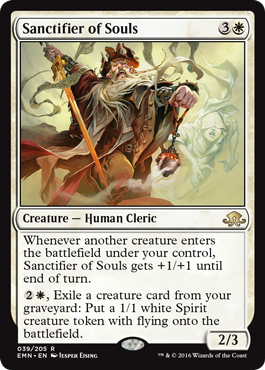
Sanctifier of Souls
3W
Creature — Human Cleric
2/3
Whenever another creature enters the battlefield under your control, Sanctifier of Souls gets +1/+1 until end of turn.
2W, Exile a creature card from your graveyard: Put a 1/1 white Spirit creature token with flying onto the battlefield.
- The last ability functions only while Sanctifier of Souls is on the battlefield. You can’t activate it while Sanctifier of Souls is in your graveyard.
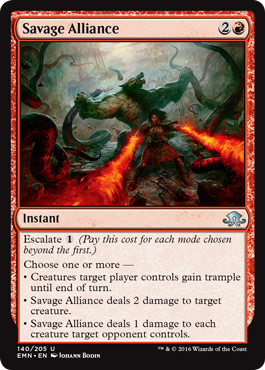
Savage Alliance
2R
Instant
Escalate 1 (Pay this cost for each mode chosen beyond the first.)
Choose one or more —
- Creatures target player controls gain trample until end of turn.
- Savage Alliance deals 2 damage to target creature.
- Savage Alliance deals 1 damage to each creature target opponent controls.
- When determining how much damage a creature with trample may assign to the player or planeswalker it’s attacking, take into account damage that has already been dealt to the blocking creatures. For example, a 4/4 creature with trample blocked by a 4/4 creature with 2 damage marked on it may assign 2 damage to that creature and 2 damage to the defending player.
- If you choose the second and third modes, and the targeted creature is controlled by the targeted opponent, that creature will take 2 plus 1 damage for a total of 3 damage. An ability that triggers whenever that creature is dealt damage will trigger twice.
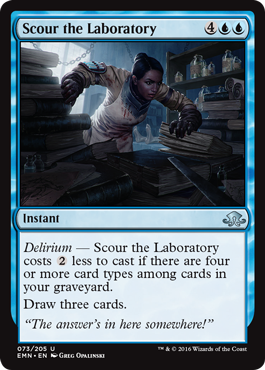
Scour the Laboratory
4UU
Instant
Delirium — Scour the Laboratory costs 2 less to cast if there are four or more card types among cards in your graveyard.
Draw three cards.
- If an effect allows you to cast Scour the Laboratory from your graveyard, count the number of card types among cards in your graveyard after moving Scour the Laboratory from your graveyard to the stack. If its delirium effect no longer applies, it costs 4UU to cast.
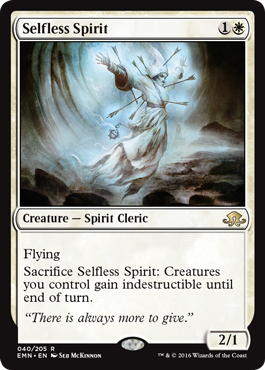
Selfless Spirit
1W
Creature — Spirit Cleric
2/1
Flying
Sacrifice Selfless Spirit: Creatures you control gain indestructible until end of turn.
- The set of creatures affected by Selfless Spirit’s last ability is determined as the ability resolves. Creatures you begin to control later in the turn won’t gain indestructible.
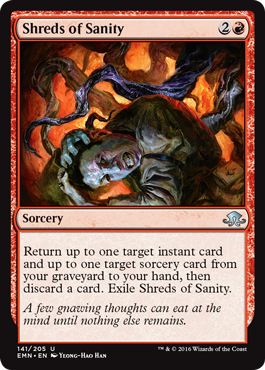
Shreds of Sanity
2R
Sorcery
Return up to one target instant card and up to one target sorcery card from your graveyard to your hand, then discard a card. Exile Shreds of Sanity.
- You may discard one of the cards you return to your hand. If you have no other cards in hand, you must discard one of the cards you return to your hand.
- You may cast Shreds of Sanity with just one target. You may also cast it without any targets if you just want to discard a card.
- If you target two cards and one of the targeted cards becomes illegal, you’ll still return the other one, discard a card, and exile Shreds of Sanity. If each targeted card becomes illegal, Shreds of Sanity is countered and you won’t discard a card or exile Shreds of Sanity.
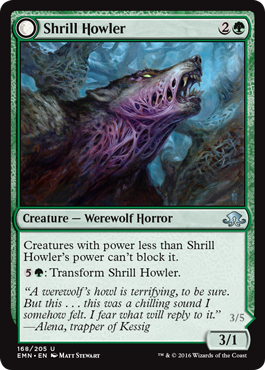
Shrill Howler
2G
Creature — Werewolf Horror
3/1
Creatures with power less than Shrill Howler’s power can’t block it.
5G: Transform Shrill Howler.
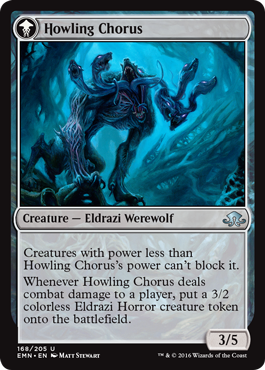
Howling Chorus
Creature — Eldrazi Werewolf
3/5
Creatures with power less than Howling Chorus’s power can’t block it.
Whenever Howling Chorus deals combat damage to a player, put a 3/2 colorless Eldrazi Horror creature token onto the battlefield.
- The power of the blocking creature and that of Shrill Howler are compared only at the moment that blockers are chosen. Changing either creature’s power later won’t cause Shrill Howler to become unblocked. The same is true for Howling Chorus.
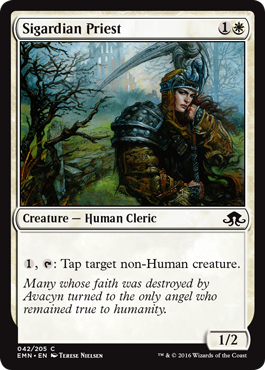
Sigardian Priest
1W
Creature — Human Cleric
1/2
1, T: Tap target non-Human creature.
- A creature that is Human and has other types, such as a Human Werewolf, isn’t a non-Human creature.
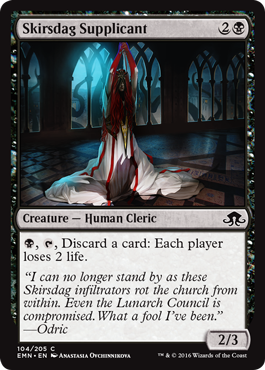
Skirsdag Supplicant
2B
Creature — Human Cleric
2/3
B, T, Discard a card: Each player loses 2 life.
- If Skirsdag Supplicant’s ability causes each player’s life total to become 0 or less, the game ends in a draw.
- In a Two-Headed Giant game, Skirsdag Supplicant’s ability causes each player to lose 2 life, so each team loses a total of 4 life.
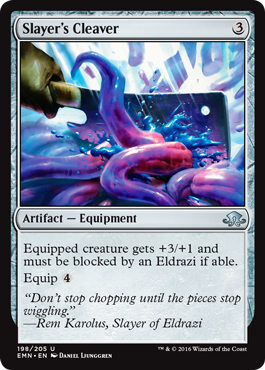
Slayer’s Cleaver
3
Artifact — Equipment
Equipped creature gets +3/+1 and must be blocked by an Eldrazi if able.
Equip 4
- Only one Eldrazi is required to block the equipped creature. Other Eldrazi and non-Eldrazi creatures may also block that creature, and are free to block other creatures or not block at all.
- The defending player, not the attacking player, chooses which Eldrazi blocks the equipped creature.
- If each Eldrazi that could block the equipped creature is tapped or is affected by a spell or ability that says it can’t block, then none of them block. If there’s a cost associated with having each of those creatures block, its controller isn’t forced to pay the cost, so they don’t have to block in that case either.
- One creature equipped with multiple Slayer’s Cleavers only requires a single Eldrazi to block it.
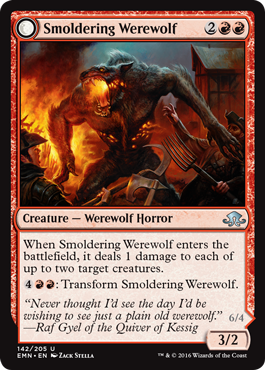
Smoldering Werewolf
2RR
Creature — Werewolf Horror
3/2
When Smoldering Werewolf enters the battlefield, it deals 1 damage to each of up to two target creatures.
4RR: Transform Smoldering Werewolf.
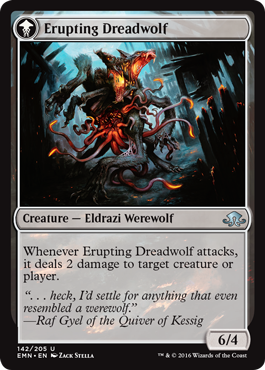
Erupting Dreadwolf
Creature — Eldrazi Werewolf
6/4
Whenever Erupting Dreadwolf attacks, it deals 2 damage to target creature or player.
- Erupting Dreadwolf’s triggered ability resolves before blockers are chosen. A creature dealt lethal damage this way won’t be around to block.
- If you transform Smoldering Werewolf into Erupting Dreadwolf after it has attacked, Erupting Dreadwolf’s triggered ability won’t trigger that combat.
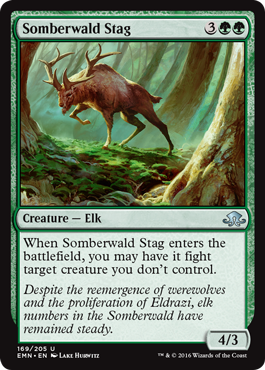
Somberwald Stag
3GG
Creature — Elk
4/3
When Somberwald Stag enters the battlefield, you may have it fight target creature you don’t control.
- You choose the target of the triggered ability as it goes on the stack, but you choose whether or not to fight as that ability resolves.
- If the targeted creature is an illegal target when Somberwald Stag’s ability tries to resolve, the ability is countered. If Somberwald Stag is no longer on the battlefield, the targeted creature won’t deal or be dealt damage.
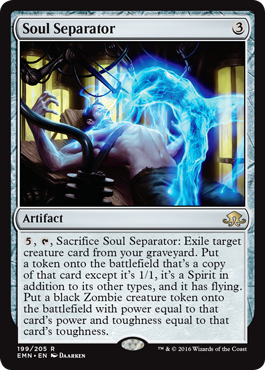
Soul Separator
3
Artifact
5, T, Sacrifice Soul Separator: Exile target creature card from your graveyard. Put a token onto the battlefield that’s a copy of that card except it’s 1/1, it’s a Spirit in addition to its other types, and it has flying. Put a black Zombie creature token onto the battlefield with power equal to that card’s power and toughness equal to that card’s toughness.
- If you copy a double-faced creature card, the Spirit token won’t be able to transform.
- If the copied creature card has X in its mana cost, X is considered to be 0.
- Any enters-the-battlefield abilities of the copied creature card will trigger when the Spirit token enters the battlefield. Any “as [this creature] enters the battlefield” or "[this creature] enters the battlefield with” abilities of the creature card will also work.
- The Spirit token has the color and mana cost (and thus converted mana cost) of the original card; the Zombie token has a converted mana cost of 0.
- Abilities that define a creature’s power and toughness apply while that card is in your graveyard, but abilities that add or subtract from it don’t. For example, the ability of Sage of Ancient Lore applies to determine the Zombie token’s power and toughness, but the ability of Liliana’s Elite doesn’t.
- If the copied creature card has an ability that defines its power and toughness, such as that of Sage of Ancient Lore, the Spirit token will still have base power and toughness 1/1.
- The power and toughness of the Zombie token are set as it’s created based on the card as it last existed in your graveyard. They won’t update if the exiled card’s power and toughness change.
- The Spirit token will be on the battlefield before the Zombie token enters the battlefield.
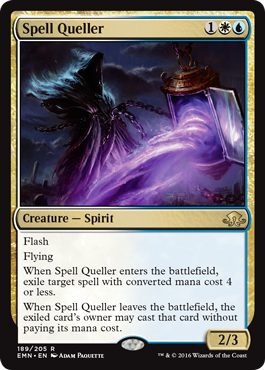
Spell Queller
1WU
Creature — Spirit
2/3
Flash
Flying
When Spell Queller enters the battlefield, exile target spell with converted mana cost 4 or less.
When Spell Queller leaves the battlefield, the exiled card’s owner may cast that card without paying its mana cost.
- For spells with X in their mana costs, use the value chosen for X to determine if the spell’s converted mana cost is 4 or less.
- Spells that can’t be countered can be exiled by Spell Queller’s ability. They won’t resolve.
- If the exiled card’s owner casts it, the spell has no relation to the spell that player originally cast. Any choices made for the original spell or effects affecting the original spell aren’t carried over to the new one.
- If the player casts the exiled card, he or she does so as part of the resolution of Spell Queller’s last ability. The player can’t wait to cast it later in the turn. Timing permissions based on the card’s type are ignored, but other restrictions (such as “Cast [this card] only during combat”) are not.
- If a player casts a card “without paying its mana cost," he or she can’t pay any alternative costs, such as emerge costs. The player can, however, pay additional costs, such as escalate costs. If the card has any mandatory additional costs, those must be paid to cast the card.
- If the card has X in its mana cost, the player must choose 0 as the value of X when casting it without paying its mana cost.
- If Spell Queller leaves the battlefield before its enters-the-battlefield triggered ability resolves, its leaves-the-battlefield triggered ability triggers, resolves, and does nothing. Then its first triggered ability resolves and exiles the spell forever.
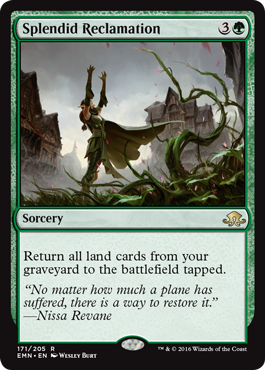
Splendid Reclamation
3G
Sorcery
Return all land cards from your graveyard to the battlefield tapped.
- If an effect states that a land enters the battlefield tapped unless a condition is met, Splendid Reclamation’s effect puts that land onto the battlefield tapped even if that condition is true. For example, you may reveal a Plains as Port Town (from the Shadows over Innistrad set) is returned to the battlefield, but Port Town will still enter tapped.
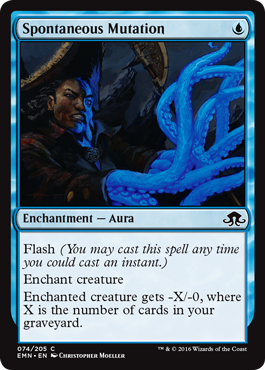
Spontaneous Mutation
U
Enchantment — Aura
Flash (You may cast this spell any time you could cast an instant.)
Enchant creature
Enchanted creature gets -X/-0, where X is the number of cards in your graveyard.
- The value of X will constantly update as the number of cards in your graveyard changes.
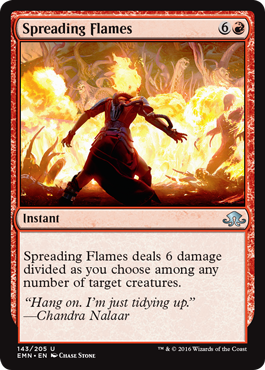
Spreading Flames
6R
Instant
Spreading Flames deals 6 damage divided as you choose among any number of target creatures.
- You announce how the damage will be divided as part of casting Spreading Flames. Each chosen target must receive at least 1 damage.
- If Spreading Flames has multiple targets, and some, but not all, are illegal targets when Spreading Flames tries to resolve, Spreading Flames will still deal damage to the remaining legal targets according to the original damage division. If all the targets are illegal, the spell will be countered.
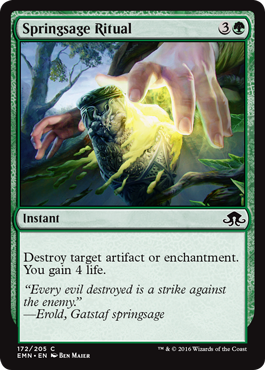
Springsage Ritual
3G
Instant
Destroy target artifact or enchantment. You gain 4 life.
- If the artifact or enchantment becomes an illegal target, Springsage Ritual is countered. You won’t gain 4 life.
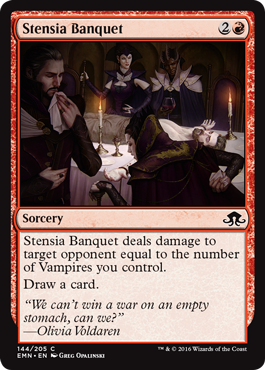
Stensia Banquet
2R
Sorcery
Stensia Banquet deals damage to target opponent equal to the number of Vampires you control.
Draw a card.
- You may cast Stensia Banquet targeting an opponent even if you control no Vampires. You’ll still draw a card.
- The number of Vampires you control is counted only as Stensia Banquet resolves.
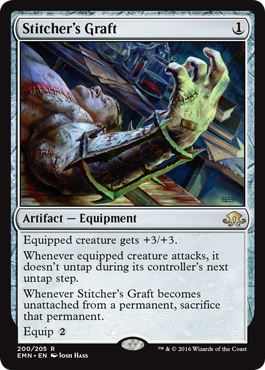
Stitcher’s Graft
1
Artifact — Equipment
Equipped creature gets +3/+3.
Whenever equipped creature attacks, it doesn’t untap during its controller’s next untap step.
Whenever Stitcher’s Graft becomes unattached from a permanent, sacrifice that permanent.
Equip 2
- If multiple effects say that a creature doesn’t untap during your next untap step, those effects all apply during one untap step. For example, a creature that attacks while equipped with two Stitcher’s Grafts will only spend one untap step without untapping.
- Stitcher’s Graft becomes unattached from the creature it’s equipping if you equip it to a new creature, if Stitcher’s Graft leaves the battlefield, if the equipped creature ceases to be a creature, or if Stitcher’s Graft ceases to be an Equipment. (It also becomes unattached if the equipped creature leaves the battlefield, but the triggered ability won’t do anything in that case.)
- If Stitcher’s Graft’s last triggered ability triggers, but you don’t control the permanent it became unattached from at the time that ability resolves (perhaps because another player has somehow gained control of it), you won’t be able to sacrifice it.
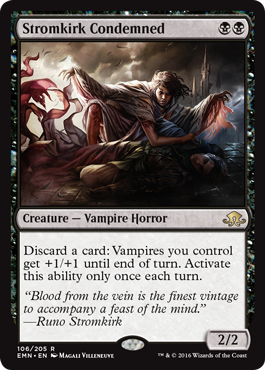
Stromkirk [autocard]Condemned[/autocard]
BB
Creature — Vampire Horror
2/2
Discard a card: Vampires you control get +1/+1 until end of turn. Activate this ability only once each turn.
- If you discard a Vampire card with madness and cast it, it’ll enter the battlefield before Stromkirk Condemned’s ability resolves.
- The set of creatures affected by Stromkirk Condemned’s ability is determined as the ability resolves. Vampires you begin to control later in the turn won’t get +1/+1.
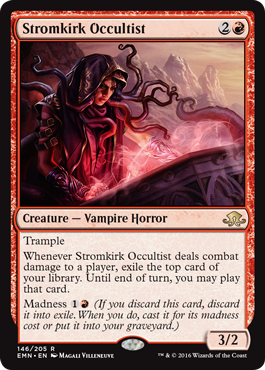
Stromkirk Occultist
2R
Creature — Vampire Horror
3/2
Trample
Whenever Stromkirk Occultist deals combat damage to a player, exile the top card of your library. Until end of turn, you may play that card.
Madness 1R (If you discard this card, discard it into exile. When you do, cast it for its madness cost or put it into your graveyard.)
- The card exiled by Stromkirk Occultist’s second ability is exiled face up.
- You may play that card that turn even if Stromkirk Occultist is no longer on the battlefield or no longer under your control.
- Playing the card exiled with Stromkirk Occultist’s second ability follows the normal rules for playing that card. You must pay its costs, and you must follow all applicable timing rules. For example, if the card is a creature card, you can cast that card by paying its mana cost only during your main phase while the stack is empty.
- You may pay alternative and additional costs for that card, such as emerge and escalate costs. If it has any mandatory additional costs, you must pay those.
- Unless an effect allows you to play additional lands that turn, you can play a land card exiled with Stromkirk Occultist’s second ability only if you haven’t played a land yet that turn.
- If you don’t play the card, it will remain exiled.
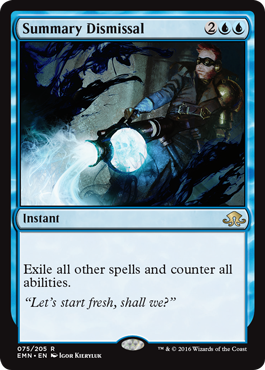
Summary Dismissal
2UU
Instant
Exile all other spells and counter all abilities.
- Spells that can’t be countered are exiled by Summary Dismissal. They won’t resolve.
- Only activated and triggered abilities on the stack are countered. Static abilities of objects remain unaffected, and activated and triggered abilities of objects may be activated or may trigger again later in the turn. Spells and abilities that have already resolved aren’t affected.
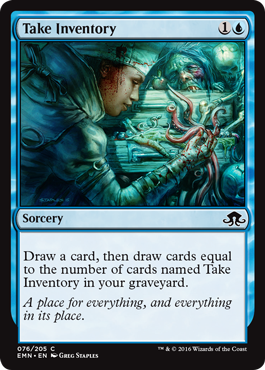
Take Inventory
1U
Sorcery
Draw a card, then draw cards equal to the number of cards named Take Inventory in your graveyard.
- Because Take Inventory is still on the stack as it’s resolving, that spell card isn’t in your graveyard and won’t affect the number of cards you draw.
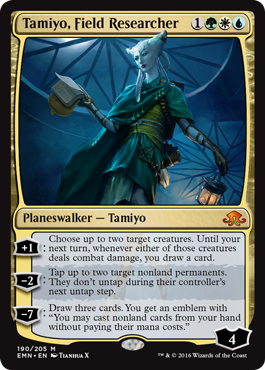
Tamiyo, Field Researcher
1GWU
Planeswalker — Tamiyo
4
+1: Choose up to two target creatures. Until your next turn, whenever either of those creatures deals combat damage, you draw a card.
−2: Tap up to two target nonland permanents. They don’t untap during their controller’s next untap step.
−7: Draw three cards. You get an emblem with “You may cast nonland cards from your hand without paying their mana costs."
- Tamiyo’s first ability can target creatures you don’t control. You’ll draw a card, not their controller, if they deal combat damage.
- Tamiyo’s first ability sets up a delayed triggered ability that triggers even if Tamiyo has left the battlefield before those creatures deal combat damage.
- You must follow the normal timing permissions and restrictions of each nonland card you cast once you get Tamiyo’s emblem.
- If you cast a card “without paying its mana cost," you can’t pay any alternative costs such as emerge costs. You can pay additional costs such as escalate costs. If the card has mandatory additional costs, you must pay those.
- If the card has X in its mana cost, you must choose 0 as the value of X when casting it without paying its mana cost.
- You may still cast nonland cards by paying their mana costs as normal.
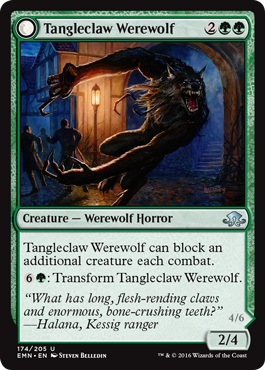
Tangleclaw Werewolf
2GG
Creature — Werewolf Horror
2/4
Tangleclaw Werewolf can block an additional creature each combat.
6G: Transform Tangleclaw Werewolf.
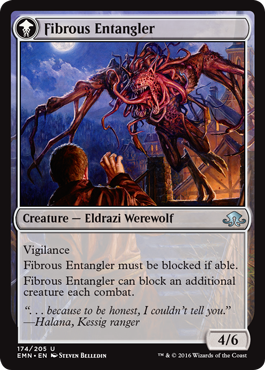
Fibrous Entangler
Creature — Eldrazi Werewolf
4/6
Vigilance
Fibrous Entangler must be blocked if able.
Fibrous Entangler can block an additional creature each combat.
- Only one creature is required to block Fibrous Entangler. Other creatures may also block it, and are free to block other creatures or not block at all.
- The defending player, not you, chooses which creature blocks Fibrous Entangler.
- If each creature that could block Fibrous Entangler is tapped or is affected by a spell or ability that says it can’t block, then none of them block. If there’s a cost associated with having each of those creatures block, its controller isn’t forced to pay the cost, so they don’t have to block in that case either.
- If Tangleclaw Werewolf transforms into Fibrous Entangler while it’s attacking, having vigilance won’t cause it to become untapped.
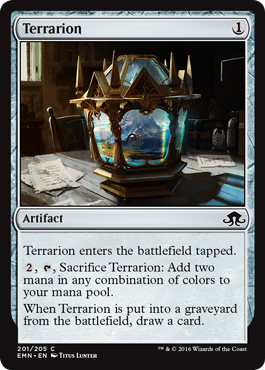
Terrarion
1
Artifact
Terrarion enters the battlefield tapped.
2, T, Sacrifice Terrarion: Add two mana in any combination of colors to your mana pool.
When Terrarion is put into a graveyard from the battlefield, draw a card.
- You must choose the colors of mana Terrarion produces before its last ability has you draw a card.
- Terrarion’s last ability triggers no matter how it’s put into a graveyard from the battlefield.
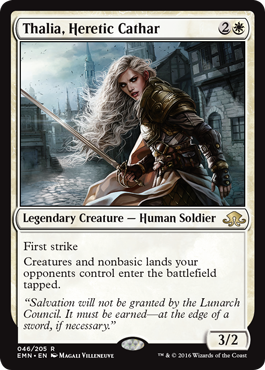
Thalia, Heretic Cathar
2W
Legendary Creature — Human Soldier
3/2
First strike
Creatures and nonbasic lands your opponents control enter the battlefield tapped.
- If an effect states that a creature or land enters the battlefield tapped unless a condition is met, Thalia’s last ability has it enter tapped even if that condition is true. For example, your opponent may reveal a Plains while playing Port Town (from the Shadows over Innistrad set), but Port Town will still enter tapped.
- If Thalia enters the battlefield at the same time as an opponent’s creatures or nonbasic lands, those creatures and lands aren’t affected by Thalia’s last ability.
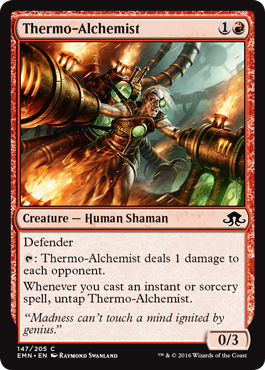
Thermo-Alchemist
1R
Creature — Human Shaman
0/3
Defender
T: Thermo-Alchemist deals 1 damage to each opponent.
Whenever you cast an instant or sorcery spell, untap Thermo-Alchemist.
- Thermo-Alchemist’s last ability resolves before the spell that caused it to trigger.
- In a Two-Headed Giant game, Thermo-Alchemist’s activated ability deals 1 damage to each opponent, so each opposing team takes a total of 2 damage.
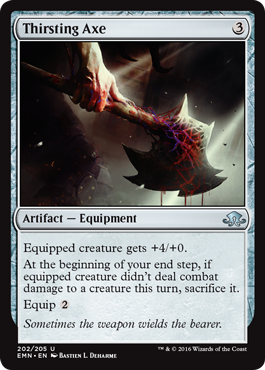
Thirsting Axe
3
Artifact — Equipment
Equipped creature gets +4/+0.
At the beginning of your end step, if equipped creature didn’t deal combat damage to a creature this turn, sacrifice it.
Equip 2
- If the equipped creature dealt combat damage only to a player or planeswalker, Thirsting Axe’s triggered ability triggers. The same is true if the creature didn’t deal combat damage at all.
- Thirsting Axe’s triggered ability checks whether the creature it’s attached to at the moment your end step begins dealt combat damage to a creature earlier in the turn. It doesn’t matter whether Thirsting Axe was attached to it (or to any creature at all) as combat damage was dealt.
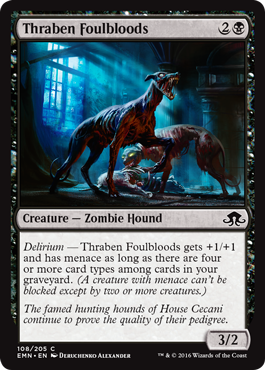
Thraben Foulbloods
2B
Creature — Zombie Hound
3/2
Delirium — Thraben Foulbloods gets +1/+1 and has menace as long as there are four or more card types among cards in your graveyard. (A creature with menace can’t be blocked except by two or more creatures.)
- Menace only matters as blockers are chosen. Causing Thraben Foulbloods to gain menace after blockers are chosen won’t cause it to become unblocked.
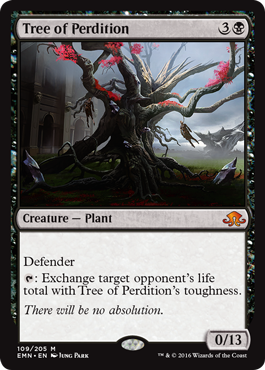
Tree of Perdition
3B
Creature — Plant
0/13
Defender
T: Exchange target opponent’s life total with Tree of Perdition’s toughness.
- If Tree of Perdition isn’t on the battlefield when the ability resolves, the exchange can’t happen and the ability will have no effect. Notably, activating the ability and giving Tree of Perdition -13/-13 in response won’t cause your opponent to lose the game.
- When the ability resolves, Tree of Perdition’s toughness becomes the targeted opponent’s former life total and that player gains or loses an amount of life necessary so that his or her life total equals Tree of Perdition’s former toughness. Other effects that interact with life gain or life loss will interact with this effect accordingly.
- Any toughness-modifying effects, counters, Auras, or Equipment will apply after its toughness is set to the player’s former life total. For example, say Tree of Perdition is equipped with Cultist’s Staff (which makes it 2/15) and the player’s life total is 7. After the exchange, Tree of Perdition would be a 2/9 creature (its toughness became 7, which was then modified by Cultist’s Staff) and the player’s life total would be 15.
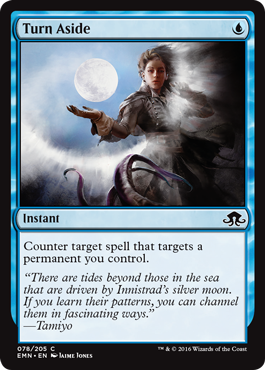
Turn Aside
U
Instant
Counter target spell that targets a permanent you control.
- Turn Aside can target a spell that has multiple targets, as long as at least one of those targets is a permanent you control.
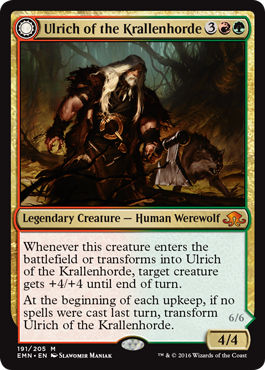
Ulrich of the Krallenhorde
3RG
Legendary Creature — Human Werewolf
4/4
Whenever this creature enters the battlefield or transforms into Ulrich of the Krallenhorde, target creature gets +4/+4 until end of turn.
At the beginning of each upkeep, if no spells were cast last turn, transform Ulrich of the Krallenhorde.
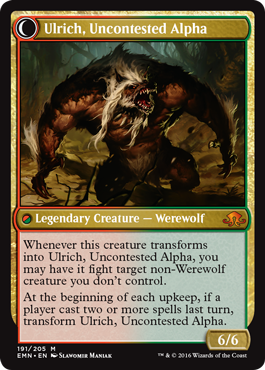
Ulrich, Uncontested Alpha
*red*, *green*
Legendary Creature — Werewolf
6/6
Whenever this creature transforms into Ulrich, Uncontested Alpha, you may have it fight target non-Werewolf creature you don’t control.
At the beginning of each upkeep, if a player cast two or more spells last turn, transform Ulrich, Uncontested Alpha.
- You choose the target of the Ulrich, Uncontested Alpha’s first ability as it goes on the stack, but you choose whether or not to fight as that ability resolves.
- If the targeted creature is an illegal target when Ulrich, Uncontested Alpha’s first ability tries to resolve, the ability is countered.
- If Ulrich is no longer on the battlefield as Ulrich, Uncontested Alpha’s first ability resolves, the targeted creature won’t deal or be dealt damage.
- Ulrich’s transform abilities look at the entire previous turn, even if Ulrich wasn’t on the battlefield for some or all of that turn.
- Ulrich, Uncontested Alpha’s last ability only triggers if a single player has cast two or more spells during the previous turn. If multiple players each cast just one spell during the previous turn, the ability won’t trigger.
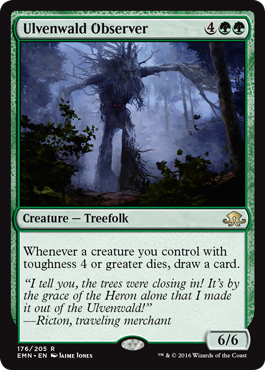
Ulvenwald Observer
4GG
Creature — Treefolk
6/6
Whenever a creature you control with toughness 4 or greater dies, draw a card.
- If Ulvenwald Observer dies at the same time as other creatures with toughness 4 or greater, its ability will trigger for each of those creatures.
- If Ulvenwald Observer’s toughness is still 4 or greater at the time it dies, its ability triggers.
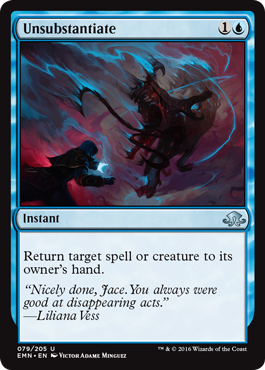
Unsubstantiate
1U
Instant
Return target spell or creature to its owner’s hand.
- Spells that can’t be countered can be returned to their owner’s hand by Unsubstantiate. They won’t resolve.
- A spell that’s a copy ceases to exist as a state-based action after being returned to its owner’s hand. It can’t be cast, and it never counts as a “card” in the player’s hand.
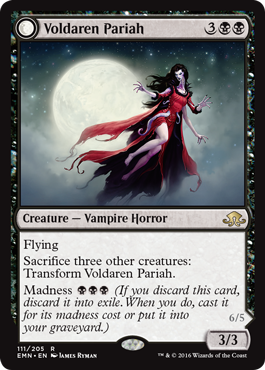
Voldaren Pariah
3BB
Creature — Vampire Horror
3/3
Flying
Sacrifice three other creatures: Transform Voldaren Pariah.
Madness BBB (If you discard this card, discard it into exile. When you do, cast it for its madness cost or put it into your graveyard.)
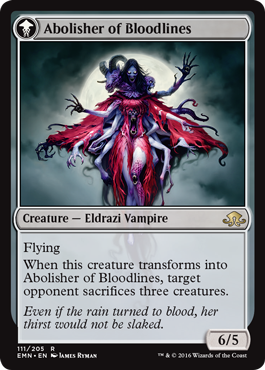
Abolisher of Bloodlines
Creature — Eldrazi Vampire
6/5
Flying
When this creature transforms into Abolisher of Bloodlines, target opponent sacrifices three creatures.
- If the targeted opponent doesn’t control three creatures as the triggered ability of Abolisher of Bloodlines resolves, that player sacrifices as many creatures as able.
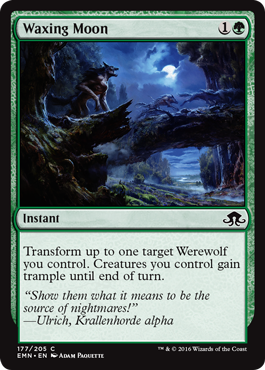
Waxing Moon
1G
Instant
Transform up to one target Werewolf you control. Creatures you control gain trample until end of turn.
- You may cast Waxing Moon without targeting a Werewolf. If you do choose a target, and that target becomes illegal, Waxing Moon is countered, and your creatures won’t gain trample.
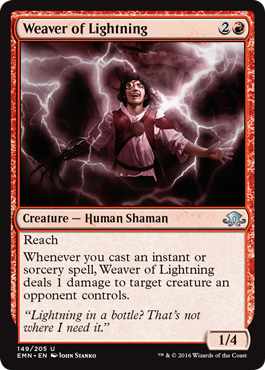
Weaver of Lightning
2R
Creature — Human Shaman
1/4
Reach
Whenever you cast an instant or sorcery spell, Weaver of Lightning deals 1 damage to target creature an opponent controls.
- Weaver of Lightning’s triggered ability resolves before the spell that caused it to trigger, but after targets for that spell have been chosen.
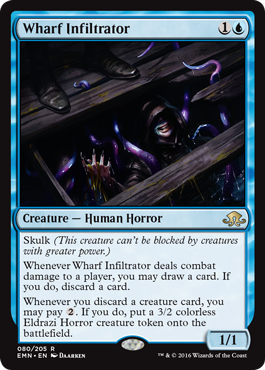
Wharf Infiltrator
1U
Creature — Human Horror
1/1
Skulk (This creature can’t be blocked by creatures with greater power.)
Whenever Wharf Infiltrator deals combat damage to a player, you may draw a card. If you do, discard a card.
Whenever you discard a creature card, you may pay 2. If you do, put a 3/2 colorless Eldrazi Horror creature token onto the battlefield.
- Wharf Infiltrator’s last ability triggers anytime you discard a creature card, not just when you discard a card because of Wharf Infiltrator’s other triggered ability.
- While resolving Wharf Infiltrator’s last ability, you can’t pay 2 multiple times to get multiple Eldrazi Horror tokens.
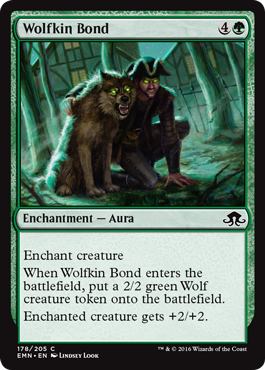
Wolfkin Bond
4G
Enchantment — Aura
Enchant creature
When Wolfkin Bond enters the battlefield, put a 2/2 green Wolf creature token onto the battlefield.
Enchanted creature gets +2/+2.
- If the target becomes illegal while Wolfkin Bond is on the stack, the spell is countered. It won’t enter the battlefield and you won’t get a Wolf token.
Magic: The Gathering, Magic, Innistrad, Eldritch Moon, Dragons of Tarkir, Magic Origins, Battle for Zendikar, Oath of the Gatewatch, and Shadows over Innistrad are trademarks of Wizards of the Coast LLC in the USA and other countries. ©2016 Wizards.
